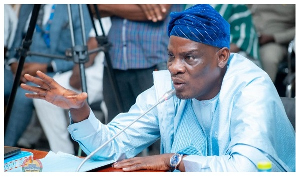 Minister for Education, Haruna Iddrisu
Minister for Education, Haruna Iddrisu
The Minister for Education, Haruna Iddrisu, has instructed the Ghana Education Service (GES) to take immediate steps to restore discipline in senior high schools nationwide.
He expressed concern about what he described as a troubling breakdown in discipline within the country’s educational institutions.
Speaking to school heads during a meeting in Sunyani, in the Bono Region, the minister cited a recent shooting incident at the SDA Senior High School in Kumasi as a glaring example of the growing indiscipline in schools.
Referencing the incident, he remarked that it “leaves much to be desired” and called for urgent reforms.
Haruna Iddrisu further emphasized that the GES Director-General, Professor Ernest Kofi Davis, has the full backing of the government to implement necessary reforms to curb violent behavior and instill discipline in schools.
“He has our full policy support to enforce those directives. So, the ‘un-Ghanaian’ development of shooting in Kumasi, the Director-General of the GES has the full support of the government to strengthen your inspection efforts so that guns, knives, and other violent tools are not found in our schools,” he stated.
This statement follows various petitions from education associations in Ghana expressing concern over the lack of discipline in second-cycle institutions.
Traders operating on the Kaneshie footbridge have been ordered to vacate the area by the end of April 2025.
The directive follows a joint inspection exercise conducted by the Accra Metropolitan Assembly (AMA), the Ministry of Local Government, Chieftaincy and Religious Affairs (MLGCRA), and the Ablekuma Central Municipal Assembly (ACMA) in the Greater Accra Region.
The inspection, carried out on Wednesday, focused on assessing the condition of deteriorating footbridges across the capital, with particular attention given to the Kaneshie Market area, one of Accra’s busiest commercial centres.
Following the inspection, the Coordinating Director of the AMA, Douglas N.K. Annoful, raised concerns about the structural integrity of the Kaneshie footbridge.
He noted that the continued occupation of the bridge by hawkers and traders was placing additional strain on the already weakened structure, raising serious safety concerns.
Mr. Annoful revealed that the AMA had previously made efforts to relocate the traders to safer and more appropriate trading spaces, but these measures had seen minimal compliance.
He emphasized that the safety of pedestrians must take priority and warned that the April 2025 deadline would be strictly enforced to prevent any potential accidents.
Authorities say the vacating of the footbridge is part of a broader plan to ensure the safety and structural maintenance of critical infrastructure in the city.
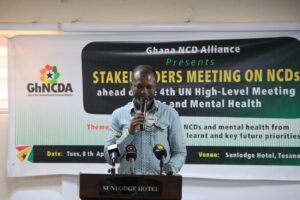
Dr Ignatius A.N. Awinibuno, Chief Programme Officer (Director) Allied Health, Ministry of Health has called on stakeholders in health to collaborate to seek financial solutions to address challenges of non-communicable diseases (NCDs).
He said, “Collaboration is the way to go. Multi-sectoral collaboration is very important. The silos approach does not bring synergy, and we end up duplicating and competing unhealthyly instead of using our potentials to maximise the limited resources we have.”
Dr Awinibuno made the call in an address at a stakeholders’ meeting on NCDs ahead of the 4th UN High Level Meeting on NCDs and Mental Health organised by the Ghana NCD Alliance in Accra.
It was on the theme, “Ghana’s progress on NCDs and mental health from 2018 to 2025: Lessons learnt and key future priorities.”
The meeting was attended by representatives from the National Health Insurance Authority, Mental Health Authority, PharmaAccess, Ghana Health Service-NCD Programme, civil society organisations, traditional leaders, and persons with live experience of NCDs
Dr Awinibuno said addressing the social determinants of health, essential matters of environment, creating finance, and local governance required an integrated holistic approach.
“I therefore urge all sectors to collaborate actively to ensure that our strategies do not remain siloed but rather contribute to robust national response.
“Financing NCDs prevention and care remains a critical issue and that it is imperative that we represent a unified strategic position that reflects our progress and aspirations at the UN High Level Meeting in September, 2025,” the Director said.
Dr Awinibuno said since 2018 the Ministry of Health had embarked on significant initiatives aimed at curbing the surge in NCDs, and that followed their commitment to achieving universal health coverage.
He said while the government had made some commendable progress in health and the launch of the MahamaCare, there was the need for stakeholders to come together to also confront the barriers that persist, thus the limited financial commitment.
Dr Awinibuno asked the stakeholders to resolve to advocate concrete financing commitment including the reactivation of the NCD Fund set out in Ghana’s National Policy Strategy.
“That will require that all sectors contribute to it. Government alone cannot do it. We know there are philanthropists who can do it, but there is the need for a clear mechanism that targets where the support should go,” he stated.
He said, “While challenges we face in the fight against NCDs are daunting, I have the unwavering faith in our collective capabilities to enact a meaningful change.”
Dr Awinibuno commended the Ghana NCD Alliance and its global partners for convening the national conversation on NCDs and mental health to seek views from all stakeholders to inform Ghana’s contribution at the 4th UN High Level Meeting in September, 2025.
Dr Beatrice Wiafe-Addae, the Chairperson of the Ghana NCD Alliance in a speech read on her behalf urged stakeholders to reaffirm their commitment to building a healthier Ghana where NCDs and mental health receive attention, resources, and support they deserve.
She said, “We cannot do all these things without neglecting environmental factors because a study by the World Health organisation shows that reducing environmental factors will help prevent NCDs.”
Dr Wiafe-Addae called on health advocates to engage in meaningful dialogue, foster partnerships, and identify actionable priorities that would not only align with global initiatives, but also address the unique means of Ghana.
“Data shows that nearly 19 percent of Ghanaians have mental illness while 41 per cent have some form of psychological distress. This is scary in our population of 32 million. Fear is escalated by apathy and inertia.
“Together, we have the power to shape the trajectory of our nation’s health landscape,” she said, adding that, “As we prepare for the 4th UN High Level Meeting, let us reaffirm our commitment to building a healthier nation.”.
Source: GNA
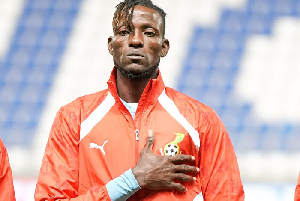 Goalkeeper, Benjamin Asare
Goalkeeper, Benjamin Asare
Public Relations Officer for Hearts of Oak, Opare Addo, says the club’s decision to extend goalkeeper Benjamin Asare’s contract was based on merit, highlighting the player’s impressive form for both club and country.
The 29-year-old signed a new deal that will keep him at Hearts of Oak until 2027.
Asare committed to the club despite reported interest from Moroccan giants Raja Casablanca and three unnamed French clubs.
The extension was officially announced on Thursday, April 10, following what the club described as “fruitful discussions” with its Board of Directors.
“Everything that he brings on board as a goalkeeper made it very necessary for us to engage him for a contract extension,” Addo told Asempa FM on Friday, April 11, 2025.
Since joining the Phobians from Great Olympics in early 2024, Asare has become a standout figure in the Ghana Premier League.
His rise has been further accelerated by commanding performances for the Black Stars, most notably on his international debut in a 5-0 win against Chad and a clean sheet against Madagascar in the 2026 World Cup qualifiers.
These displays have convinced national team coach Otto Addo to name Asare as Ghana’s first-choice goalkeeper, ahead of Lawrence Ati-Zigi and Jojo Wollacott.
Medeama SC produced a dominant display to end Dreams FC’s eight-game unbeaten run with a comprehensive 4-0 victory at the Tarkwa and Aboso Stadium on Friday, April 11, 2025.
Kingsley Braye was the star of the evening, netting a sensational hat-trick, one of which came from the penalty spot, to hand the mauve and yellow a much-needed response following last week’s narrow defeat to Hearts of Oak.
Mubarik Yussif also converted from the spot to cap off a commanding team performance.
Braye’s treble made him the first player to score a hat-trick at the newly commissioned TnA Stadium, a milestone that added extra weight to his outstanding individual performance.
Medeama controlled the match from start to finish, dominating possession with 63% and registering 14 shots, six of which were on target.
In contrast, Dreams FC, who arrived in Tarkwa unbeaten in their last eight matches (six wins and two draws), struggled to find their rhythm, managing only eight shots, three of which were on target.
The result sees Medeama climb into the top four on the league table, a welcome boost as they prepare to face Heart of Lions in their next fixture. Dreams FC, who drop to eighth, will aim to bounce back when they travel to face Nations FC.
A Chinese businessman and six Ghanaians are before an Accra Circuit Court over an alleged GH¢440,000.00 game-cheating deal at the Golden Dragon Casino in Osu, Accra.
Mu Shuai has denied agreeing with his alleged accomplices—Rudolph Ayin, Loveland Odamtten Okpoti, Joseph Addo Narh, Ibrahim Tijani, Kelvin Baidoo, and Elijah Larbi—to cheat the casino. Similarly, Ayin, Okpoti, Narh, Tijani, Baidoo, and Larbi, all workers at the casino, have denied conspiring with Shuai to cheat their employer.
The accused individuals were each granted bail of GH¢400,000.00 with two sureties. One of the sureties for each accused person must be justified, and one of Shuai’s sureties must be a Chinese national, as per the court’s order. Additionally, Shuai is required to deposit his travel documents with the court’s registry.
Shuai, Ayin, and Narh must report to the police once a week. The court has set their next hearing date for April 24, 2025.
Assistant Superintendent of Police (ASP) Benjamin Baafi, prosecuting, stated that the complainant was the manageress of the Golden Dragon Casino, while Shuai was a player. Ayin, Okpoti, Narh, Tijani, Baidoo, and Larbi were employees at the casino.
In 2024, Shuai registered with the casino and began playing. The company tracks customer activity daily, and Shuai’s daily records indicated unusual wins. He was monitored over time, and on February 16, 2025, the surveillance manager discovered an abnormal card deal between Shuai and Narh, which violated the casino’s gaming standards.
ASP Baafi said the system was reviewed and traced Shuai’s activity with dealers back to September 2024. It was found that on multiple occasions, Shuai and his alleged accomplices had engaged in card-flashing, which contravened the casino’s gaming rules.
A detailed investigation showed that Shuai had wrongfully won GH¢440,000.00 with the help of the casino staff. The casino then lodged a formal complaint with the police, which led to the arrest of the accused individuals.
During investigations, Shuai admitted to the offense in his cautioned statement and refunded the amount to the casino through another player. The accused persons denied the offense but admitted receiving money from Shuai as a reward whenever he played and won.
CCTV footage revealed that the accused persons conspired to cheat the casino. After completing the investigation, all were charged with the offenses and brought to trial.
The Public Utilities Regulatory Commission (PURC) has announced an upward adjustment in electricity and water tariffs.
The new adjustments will take effect on May 3, 2025, according to a statement issued by the PURC.
Electricity tariffs will increase by an average of 14.75%, while water tariffs will rise by 4.02%.
The revision follows the Commission’s quarterly tariff review process for the first and second quarters of 2025.
According to the PURC, the review aims to ensure stability for utility service providers while minimizing the financial impact on consumers.
The PURC revealed that the adjustments were approved due to factors such as the exchange rate between the Ghana cedi and the US dollar, inflation projections, fuel costs (particularly natural gas), and the current hydro-thermal generation mix.
It also highlighted the need to recover 50% of outstanding revenue, amounting to GH¢976 million, from previous quarters in 2024.
The PURC further explained that, as part of efforts to ease the burden on consumers, the remaining 50% will be spread over subsequent quarters in 2025.
Additionally, the tariff increases are necessary to address under-recoveries by utility companies, which, if unaddressed, could result in service disruptions.
Below is the full statement
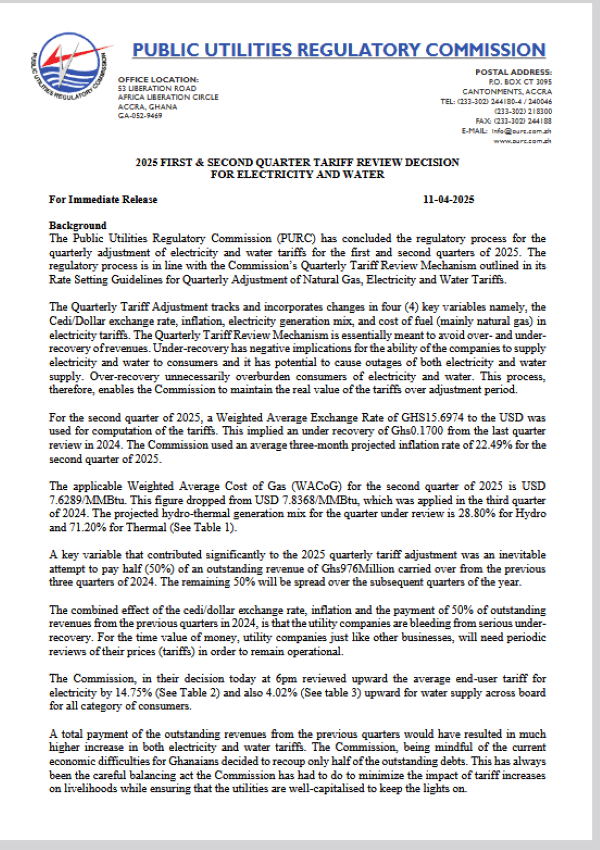
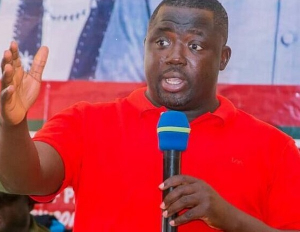 NDC Deputy General Secretary, Mustapha Gbande
NDC Deputy General Secretary, Mustapha Gbande
Deputy General Secretary of the National Democratic Congress (NDC), Mustapha Gbande, has criticized the incarceration of foreign nationals involved in illegal mining, describing it as an unnecessary financial burden on the Ghanaian state.
Speaking on Starr Chat with Bola Ray, Gbande argued that while Ghanaian citizens engaged in galamsey (illegal mining) should face prosecution and imprisonment, foreign nationals should instead be deported and banned from re-entering the country.
“Once you arrest somebody, it’s an expenditure on the state. If you jail the person, it’s an expenditure on the state,” he stated. “If you’ve come from your country with the sole purpose of being irresponsible in ours, when you are caught, it doesn’t matter your investment—you should be taken out and banned from coming back.”
Gbande emphasized the need for “ruthless steps” to protect Ghana’s environment and natural resources, citing evidence that some foreign nationals—particularly certain Chinese miners—cause more significant environmental destruction due to their large-scale operations and use of heavy machinery.
He further alleged that during the tenure of the New Patriotic Party (NPP), some Chinese illegal miners were protected by military forces, allowing them to operate freely in forest reserves. “That is what the NPP did, and I’m saying this because I know it—I’ve been in the field,” Gbande claimed.
Praising the Interior Minister’s recent directive to deport foreign galamsey operators while jailing Ghanaian offenders, Gbande added that nationals from neighboring countries, such as Guinea, should be ordered to repair the damage they cause or face imprisonment.
“If you’re a Ghanaian, you should be taken straight to court and given an ultimatum to go and repair the damage. If you don’t do it, you are jailed. When we do that, by the time we jail a thousand people, we will set the system right,” he concluded.
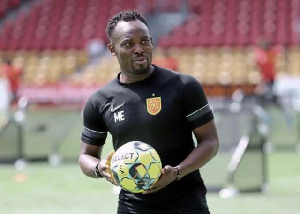 Michael Essien, former Black Stars player
Michael Essien, former Black Stars player
Ghana forward Kamaldeen Sulemana has named Black Stars great Michael Essien as one of the best African players to ever play in the English Premier League.
In a five-a-side team selected by the Southampton winger, he included the former Ghanaian midfielder alongside Ivorian legends Didier Drogba and Yaya Touré, Nigeria’s Jay-Jay Okocha, and Egyptian sensation Mohamed Salah.
“I’m not choosing a goalkeeper because we’re playing with small poles, tiki-taka format, okay? Here they are: Yaya Touré, Michael Essien, Jay-Jay Okocha, Mohamed Salah, Didier Drogba.
“Mohamed Salah will play on the right, Jay-Jay Okocha will play on the left, and then two players to hold in the middle with Didier Drogba up front. What a team with flair,” Kamaldeen Sulemana told Showmax in an interview.
Kamaldeen Sulemana, 23, has recently been in fine form for Southampton. Although the club has been relegated from the Premier League, he has been a bright spot in their last few games.
He will be a key player for the Saints next season when the team competes in the EFL Championship.
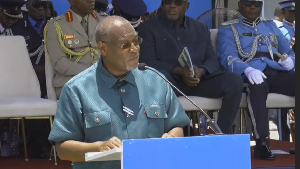 Alex Segbefia, spoke on behalf of the Vice President
Alex Segbefia, spoke on behalf of the Vice President
The Vice President of the Republic of Ghana, Professor Naana Jane Opoku-Agyemang, has charged newly commissioned officer cadets of the Customs Division of the Ghana Revenue Authority (GRA) to uphold discipline, integrity, and professionalism in the discharge of their duties to help strengthen Ghana’s economic resilience and development.
Speaking as the Special Guest of Honour and Reviewing Officer at the graduation ceremony of Customs Officer Cadets on Friday April 11, 2025, in the Volta Region, on behalf of the Vice President, Alex Segbefia, described the event as both a celebration of their endurance through nine months of rigorous training and the beginning of a lifelong commitment to national service.
“You are not just tax collectors,” she told the graduates, “You are ambassadors of Ghana.
“Your interactions with traders and travelers shape perceptions of our nation. Every cedi properly assessed and collected helps build schools, supply hospitals, and invest in infrastructure.”
In a speech focused heavily on the nation’s economic future, Opoku-Agyemang underscored the urgent need to strengthen domestic revenue mobilization amid declining international financing options.
She announced a series of measures the government is undertaking to enhance revenue collection and reduce reliance on external funding.
A review of the tax exemption regime to promote transparency and job creation.
Rationalization of port fees to boost trade competitiveness.
Restructuring of the GRA to improve compliance and administration.
Enactment of a Natural Resources Revenue Management Act to better harness earnings from mineral wealth.
Review of the Petroleum Revenue Management Act to optimize oil revenue.
Harmonization of tax regimes for equity and efficiency.
“Self-reliance is no longer an ambition, but an imperative,” she emphasized, adding that Ghana’s prosperity must be built primarily through the country’s own efforts and resources.
Opoku-Agyemang acknowledged that the Customs Division remains understaffed, with only 2,635 officers currently serving against an established need of 5,329.
She expressed joy at the boost the new cadets bring to the workforce and assured the government’s commitment to improving staff conditions and providing necessary resources to enhance operational efficiency.
She urged the cadets to remain vigilant against smuggling and corruption, warning of the far-reaching effects of unethical behavior.
“When you are tempted to look the other way, remember the patient without medicine, the child learning under a tree, and the village without roads. Your honesty and diligence are vital to national development,” she said.
Highlighting the comprehensive training received by the officer cadets, including customs procedures, leadership, weapon handling, and the use of Ghana’s Integrated Customs Management System, the Vice President expressed hope that the graduating class would be the generation to transform the Customs Division into a model of excellence across the continent.
“For the first time, defensive driving was also introduced into your training,” she revealed, adding that all cadets will be certified in this new skill to enhance safety and operational efficiency.
She congratulated the best-performing cadets, commending their exceptional dedication, and officially declared the officers as graduates of the Customs Division.
“May your service bring honour to yourselves, pride to the Ghana Revenue Authority, and prosperity to Ghana,” she concluded.
Professor Patrice Loch Otieno Lumumba has urged young Africans to rise above the mentality of inferiority imposed by colonization.
Speaking at the University of Education, Winneba (UEW), during the 21st Century Education Public Lecture Series, Lumumba told students they must reclaim Africa’s greatness.
“Our very presence here is a reminder that we must reclaim our past,” he said.
He referred to the iconic words of South African leader Pixley Ka Isaka Seme, who once called on Africans to regenerate their continent.
“We have a duty as Africans to regenerate ourselves. You can only regenerate that which has already been generated,” he observed.
Lumumba also cited the famous Ghanaian educationist James Emman Kwegyir Aggrey, popularly known as Aggrey of Africa, who inspired Africans to recognize their worth beyond colonization.
“Although we have, courtesy of colonization, been fed on chicken feed for too long, we are eagles—and we can fly,” he said.
He encouraged African youth to stop limiting themselves and to begin taking charge of Africa’s future with pride and purpose.
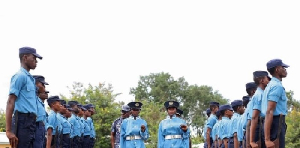 Customs cadet at the graduation parade
Customs cadet at the graduation parade
The Vice President of the Republic of Ghana, Her Excellency Naana Jane Opoku-Agyemang, has charged newly commissioned officer cadets of the Customs Division of the Ghana Revenue Authority (GRA) to uphold discipline, integrity, and professionalism in the discharge of their duties, in order to help strengthen Ghana’s economic resilience and development.
Speaking as the Special Guest of Honour and Reviewing Officer at the graduation ceremony of Customs Officer Cadets on Friday in the Volta Region, Alex Segbefia, representing the Vice President—described the event as both a celebration of the cadets’ endurance through nine months of rigorous training and the beginning of a lifelong commitment to national service.
“You are not just tax collectors,” she told the graduates. “You are ambassadors of Ghana. Your interactions with traders and travelers shape perceptions of our nation. Every cedi properly assessed and collected helps build schools, supply hospitals, and invest in infrastructure.”
In a speech focused heavily on the nation’s economic future, Vice President Opoku-Agyemang underscored the urgent need to strengthen domestic revenue mobilization amid declining international financing options.
She announced a series of measures the government is undertaking to enhance revenue collection and reduce reliance on external funding. These include:
A review of the tax exemption regime to promote transparency and job creation.
Rationalization of port fees to boost trade competitiveness.
Restructuring of the GRA to improve compliance and administration.
Enactment of a Natural Resources Revenue Management Act to better harness earnings from mineral wealth.
Review of the Petroleum Revenue Management Act to optimize oil revenue.
Harmonization of tax regimes for equity and efficiency.
“Self-reliance is no longer an ambition, but an imperative,” she emphasized, adding that Ghana’s prosperity must be built primarily through the country’s own efforts and resources.
Opoku-Agyemang acknowledged that the Customs Division remains understaffed, with only 2,635 officers currently serving against an established need of 5,329. She expressed satisfaction with the boost the new cadets bring to the workforce and assured the government’s commitment to improving staff conditions and providing the necessary resources to enhance operational efficiency.
She urged the cadets to remain vigilant against smuggling and corruption, warning of the far-reaching effects of unethical behavior.
“When you are tempted to look the other way, remember the patient without medicine, the child learning under a tree, and the village without roads. Your honesty and diligence are vital to national development,” she said.
Highlighting the comprehensive training received by the officer cadets—including customs procedures, leadership, weapon handling, and the use of Ghana’s Integrated Customs Management System—the Vice President expressed hope that the graduating class would be the generation to transform the Customs Division into a model of excellence across the continent.
“For the first time, defensive driving was also introduced into your training,” she revealed, adding that all cadets will be certified in this new skill to enhance safety and operational efficiency.
She congratulated the best-performing cadets, commending their exceptional dedication, and officially declared the officers as graduates of the Customs Division.
“May your service bring honour to yourselves, pride to the Ghana Revenue Authority, and prosperity to Ghana,” she concluded.
Hilda Bassey’s fashion sense stands out because she effortlessly combines elegance with modern trends, making her style a perfect reference for classic ladies who want to look luxurious. Her outfits are carefully chosen to reflect confidence, femininity, and class, which is why they leave lasting impressions at every appearance. She often wears structured dresses that highlight her silhouette, and this choice not only enhances her figure but also creates a graceful and powerful look. Because tailored pieces offer a polished effect, classic ladies can adopt similar designs to bring sophistication into their wardrobe.
She pays attention to fabric quality, often opting for rich materials like satin, silk, and sequins, which help her outfits shine without being excessive. These fabrics reflect light and add a sense of elegance, making them perfect for evening events or formal gatherings. Hilda also uses solid colors and minimal patterns, which allow the structure and details of the outfit to stand out clearly. Since simplicity in color brings focus to design, this approach makes the overall look appear more refined and luxurious.
Accessories play a supportive role in her style, as she selects statement pieces that complement rather than overpower her outfits. Choosing bold earrings or elegant clutches adds charm without distraction, and this balance keeps the entire ensemble visually pleasing. Her hairstyles are often sleek and well-groomed, contributing to a polished final look that matches her fashion choices. Because every element of her appearance works together seamlessly, her fashion sense consistently inspires admiration.
By following her example, classic ladies can choose structured, high-quality pieces, focus on subtle elegance, and complete their looks with tasteful accessories. This combination creates a luxurious image that remains modest and stylish. Therefore, replicating Hilda Bassey’s outstanding fashion sense helps women embrace timeless beauty with modern grace.
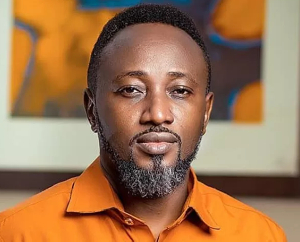 Actor and media personality, George Quaye
Actor and media personality, George Quaye
Actor and media personality, George Quaye has stirred conversation online after boldly suggesting that Ghana should officially adopt Twi as its national language.
Speaking on Joy FM, as monitored by MyNewsGh, Quaye, who is Ga himself—acknowledged the sensitivity of the topic, especially for non-Akan ethnic groups. However, he argued that the reality on the ground is clear.
“Let’s stop pretending,” George Quaye said. “Whether we like it or not, Twi has become the most commonly spoken language in Ghana. You can go to the North, Volta, or even some parts of the Western Region, and Twi is still the language people use when they don’t share the same mother tongue.”
He explained that the widespread use of the Akan language is not a result of coercion, but rather convenience.
“The Akans are located almost in the middle of Ghana. So naturally, when people move across the country—for business, school, or any other reason—Twi becomes the easiest language for communication. It’s everywhere,” he emphasized.
Quaye’s comments have since sparked heated discussions. While many agree with his assertion, others believe that promoting one local language as the national standard could marginalize Ghana’s diverse cultural heritage.
But Quaye insists that his call isn’t about tribal superiority, but about acknowledging a practical reality.
“It’s not about Akan dominance or anything like that. It’s just what it is. If tomorrow Ga, Ewe, or Dagbani became this widely spoken, I’d say the same thing,” he added.
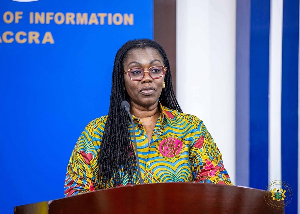 Former Minister of Communication, Ursula Owusu-Ekuful
Former Minister of Communication, Ursula Owusu-Ekuful
President of policy think tank IMANI Africa, Franklin Cudjoe, has taunted former Communications minister, Ursula Owusu-Ekuful over the KelniGVG contract.
He is questioning her about the money the state has spent on KelniGVG for no work done over the years.
Franklin Cudjoe has urged the current minister to cancel the contract, which he says has not been of any value to the country.
He believes that all monies paid to KelniGVG should be retrieved from the former Communications minister, arguing that she was warned about the consequences but dismissed the concerns of industry experts who opposed the contract.
“Ursula Owusu, where is our $179 million? Sam George, cancel the $179m KelniGVG heist,” he said in a post shared on social media.
About the KelniGvG deal
The KelniGVG deal, valued at $89 million, was heavily criticised when it was announced because of its similarity with controversial agreements the state entered into with Subah Infosolutions and Afriwave Telcom Ltd in 2010 and 2016 respectively.
The deal faced multiple lawsuits amid allegations of corruption and underhand dealings in the award of the revenue assurance monitoring contract to KelniGVG.
A lot of the criticism of the deal came from think tank IMANI Africa which also raised privacy concerns while questioning the credibility of KelniGVG.
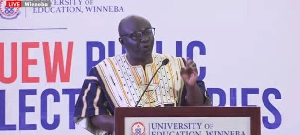 Dr Samuel Koranteng Pipim
Dr Samuel Koranteng Pipim
A US-based Ghanaian author, speaker, and theologian, Dr Samuel Koranteng Pipim has likened his mission of inspiring Africa’s youth to that of John the Baptist in the Bible.
Speaking at the 2025 Public Lecture Series organized by the University of Education, Winneba (UEW), Dr Pipim revealed that he sees himself as a forerunner, preparing the way for future African leaders.
“In a way, I love my role because I am like John the Baptist — a voice crying in the wilderness, preparing the way for you,” Dr Pipim remarked.
The well-attended lecture, themed “Empowering Minds, Shaping Futures for 21st Century Education,” brought together distinguished academics, policymakers, and students to discuss the future of education in Ghana.
Dr Pipim used the platform to highlight the need for mentorship, leadership development, and moral guidance for the younger generation.
“Ghana’s and Africa’s future depend on how well we prepare and empower today’s youth — not just intellectually, but morally and skillfully,” he added.
He commended the University of Education, Winneba, for its efforts in training future teachers and called on stakeholders to continue supporting initiatives that build holistic leaders for the 21st century.
Bawku is predominantly inhabited by two main ethnic groups: the Kusasis and the Mamprusis.
The conflict between these groups has roots in historical tensions, competition over resources, and political rivalries.
Although efforts have been made to arrest the situation and ensure a lasting solution to the challenge, these efforts have always been stifled.
Each time peace is given a chance, the issues escalate leading to the loss of lives and properties.
Reports indicate that throughout the conflict, 300 lives have been lost with several properties destroyed.
Former Upper East Regional Minister Tangoba Abayage, who has been alive throughout the period and has experienced the Bawku conflict, puts the challenges succinctly in a post shared via social media.
Her post recalled the attacks on lives and properties and efforts that have proven futile over the years.
She said “In the history books:
Hon. Hawa Yakubu’s house was burnt down
President Kufuor’s vehicle was water bombed (so minor it was never noticed)
Mark Wonyongo’s entourage was attacked
Security forces were attacked
Ayariga’s house has been attacked
IGP’s vehicle has been attacked.
I’m sure I’ve missed a few.
It’s all down history line.
I saw my brother Bombande’s write up yesterday. We (he and I) have been together on so many committees that sought to bring peace to Bawku.
It’s been a long history that needs real pragmatic non aligned approach to solve.
How that will be, I don’t know but I genuinely pray it happens”.
A Louisiana immigration judge said Friday that Columbia University graduate Mahmoud Khalil – a legal permanent resident – can be deported after the United States government argued his presence posed “potentially serious foreign policy consequences.”
The decision by Assistant Chief Immigration Judge Jamee Comans comes after the federal government submitted evidence to the court on Wednesday, including a memo from Secretary of State Marco Rubio alleging Khalil is deportable because of his “beliefs, statements or associations” that would compromise US foreign policy interests.
Khalil’s attorneys said the judge’s decision was solely based on Rubio’s memo – which contained no allegations of criminal activity – and was a violation of the graduate’s constitutional right to free speech that sets a harmful precedent.
“Despite the government’s failure to prove that Mahmoud broke any law, the court has decided that lawful permanent residents can have their status revoked for pro-Palestine advocacy,” Khalil’s legal team said at a press conference following the hearing. “This is a blatant violation of the First Amendment and a dangerous precedent for anyone who believes in free speech and political expression.”
A “removability finding” in immigration court means the judge has determined the individual is subject to removal from the United States due to a violation of immigration law or lack of legal immigration status. Khalil’s attorneys are expected to appeal the ruling.
Khalil was arrested last month by federal agents outside of his apartment on the campus of Columbia University following a deportation order from the Trump administration. Khalil, who is married to a US citizen, is a prominent Palestinian activist and played a central role in protests against Israel’s war in Gaza on the Ivy League campus last year.
Khalil’s attorneys have challenged the accusations against him in federal and immigration court, saying he is being targeted over his pro-Palestine activism.
At the end of Friday’s hearing, Khalil told the court he hasn’t been granted “due process rights and fundamental fairness,” according to a news release from the American Civil Liberties Union, which is representing him in the case.
“Neither of these principles were present today or in this whole process,” Khalil said. “This is exactly why the Trump administration has sent me to this court, 1,000 miles away from my family.”
Noor Abdalla, Khalil’s wife, said her husband is being imprisoned for his pro-Palestine advocacy.
“My husband is a political prisoner who is being deprived of his rights because he believes Palestinians deserve equal dignity and freedom,” she said in a statement that was read during Friday’s briefing. “There is nothing the government can say about my husband that can silence this truth.”
Khalil is among the first of a string of students or faculty members at college campuses across the country – living in the US as permanent residents or through work or student visas – who have been detained by federal agents as part of the administration’s immigration crackdown. More than 500 students, faculty and researchers have had their visas revoked this year.
Khalil’s legal team on Friday called into question the judge basing her decision on Rubio’s memo, which they said “makes extremely broad claims.”
The attorneys had made several requests with the immigration court – including filing a motion to see evidence supporting Rubio’s finding, a continuance request to continue arguing against the deportation order and a motion to file a waiver to contest his removal. All three motions were denied, his attorneys said.
“Today, we saw our worst fears play out: Mahmoud was subject to a charade of due process, a flagrant violation of his right to a fair hearing, and a weaponization of immigration law to suppress dissent,” Marc van der Hout, an immigration attorney for Khalil, said in a statement Friday.
Khalil’s lawyers will continue to challenge his deportation. Comens gave them until April 23 to submit new motions.
The team expects several more immigration hearings will be held before a final decision is made, after which they can make an appeal to the Board of Immigration Appeals.
As Khalil’s immigration attorneys plan their next steps, a separate case in federal court in New Jersey will continue to play out. Khalil’s attorneys have filed multiple petitions challenging the legality of his arrest and detention.
Federal district court Judge Michael Farbiarz, who is overseeing Khalil’s case in New Jersey, told attorneys in a phone conference Friday that he is still deciding whether he has the jurisdiction over the claims filed by Khalil’s legal team – including a habeas corpus motion, a motion to bring him back to the New York area, and a motion to release him on bail.
Khalil’s team will continue to seek bail and a preliminary injunction that would release him from custody while his immigration case proceeds, according to the news release from the ACLU.
“What happened in immigration court today only confirms the need for the federal court to really intervene and make a decision in this case, because the immigration court made clear today that it won’t, and it believes it can’t,” ACLU lawyer Amy Belsher, one of Khalil’s attorneys, said Friday.
Friday’s ruling could have a chilling effect on free speech at colleges and universities in the US, Gloria J. Browne-Marshall, constitutional law professor at John Jay College of Criminal Justice, told CNN Friday.
“It is chilling to all speech rights when the federal government’s memo sets out no criminal charges against Mahmoud but seems to say one person can affect American foreign policy through student protests,” she said.
As a graduate student at Columbia University, Khalil served as a prominent negotiator for student protesters in talks with the Ivy League school’s administration over last spring’s contentious campus encampment to protest Israel’s war in Gaza.
Khalil’s case has sparked a firestorm of controversy since the night in March when he was arrested outside his university residence where he was living with his wife, a US citizen, who is nine months pregnant. He was transferred to a Louisiana detention center, where his immigration proceedings have taken place.
The administration ordered Khalil’s deportation “based on information provided by the DHS/ICE/HSI regarding the participation and roles of (redacted) and Khalil in antisemitic protests and disruptive activities, which fosters a hostile environment for Jewish students in the United States,” Rubio stated in the memo submitted Wednesday.
The actions and continued presence of Khalil in the US “undermine U.S. policy to combat anti-Semitism around the world and in the United States, in addition to efforts to protect Jewish students from harassment and violence in the United States,” the memo continues.
Khalil’s attorneys previously said they would contest the evidence at the hearing and ask for an opportunity to depose Rubio.
Van Der Hout said the government had submitted evidence showing that Khalil was involved in protest negotiations at Columbia, but has not submitted evidence supporting the foreign policy allegation.
“The Rubio letter is the only piece of evidence going to the main charge in this case,” Van Der Hout said Thursday. “There is zero else.”
Van Der Hout also challenged the government’s description of antisemitism.
“What is the antisemitism? It is criticizing Israel and the United States for the slaughtering that is going on in Gaza, in Palestine. That’s what this case is about,” Van Der Hout said.
While ICE maintains that its detention of individuals is “non-punitive,” some immigration attorneys say that the agency is strategically isolating disfavored immigrants from their attorneys, families and support systems.
In a statement following Friday’s hearing, Abdalla said she will continue to advocate for her husband’s return home, though he may miss the birth of their first child in less than a month.
“Every day that he remains detained is another day that he suffers irreparable harm,” attorney Johnny Sinodis said Friday.
Sinodis questioned the precedent Friday’s decision sets for others like Khalil.
Like Khalil, Tufts University PhD student Rümeysa Öztürk and Georgetown University fellow Badar Khan Suri are facing deportation as the Trump administration takes aim at pro-Palestinian demonstrators and activists on college campuses.
“We must not give in to this chilling effect,” Khalil’s lawyers said in a statement Friday. “For Mahmoud, for Rumeysa, for Badr Khan Suri and for hundreds of others.”
The Trump administration, which accused Khalil of being a Hamas supporter, said it’s acting on a section of US immigration law that provides broad authority to revoke a person’s immigration status if the Secretary of State deems their “activities in the United States would have potentially serious adverse foreign policy consequences” to the country.
“For cases in which the basis for this determination is the alien’s past, current, or expected beliefs, statements, or associations that are otherwise lawful, the Secretary of State must personally determine that the alien’s presence or activities would compromise a compelling U.S. foreign policy interest,” the newly released memo from Rubio reads.
That provision that the Trump administration is trying to use against Khalil – and other activists – is incredibly vague, New York University law professor Adam Cox told CNN.
Cox recently joined a group of 150 immigration lawyers and legal scholars in filing an amicus brief in Khalil’s federal case.
In the years since that provision was created in 1990, the provision was used in just 15 of 11.7 million removal cases, the brief notes. Of those 15, only five involved detention throughout the case and just four ultimately resulted in deportation, the experts noted.
While the authors did not have insight into the details of each case, they said they were unaware of the provision ever before being used against a lawful permanent resident “where the underlying conduct was itself political speech.”
“It may well be that Mr. Khalil’s case is unprecedented in the history of this provision and in the history of the United States. At a minimum, the government’s assertion of authority here is extraordinary—indeed, vanishingly rare,” the brief notes.
With that provision being used against other students swept up in Trump’s immigration crackdown, Cox says the decision made in Khalil’s case Friday could be important for cases to come.
DISCLAIMER: The Views, Comments, Opinions, Contributions and Statements made by Readers and Contributors on this platform do not necessarily represent the views or policy of Multimedia Group Limited.
Wiper Party leader Kalonzo Musyoka makes his remarks during the second Mwai Kibaki Memorial Lecture and Luncheon at Serena Hotel, Nairobi on April 11, 2025. Photo credit: Francis Nderitu | Nation Media Group
Kenya’s opposition leaders have called out President William Ruto over his handling of the problems facing the country and urged him to emulate President Mwai Kibaki in steering the country forward.
During a memorial lecture in honour of the late President Kibaki, who died in April 2022, impeached Deputy President Rigathi Gachagua and former Vice President Kalonzo Musyoka praised the former Head of State as Kenya’s best leader with an incomparable legacy.
Mr Gachagua was especially vocal, praising Kibaki’s exemplary development record, which he described as a benchmark of sound economic management.
He criticised the current government’s approach, calling it a “massive downgrade” from the Kibaki era between 2003 and 2013.
In particular, Mr Gachagua said the government’s brutal reaction targeting students and journalists following the controversy surrounding Buteres High School play, Echoes of War, written by former Kakamega senator Cleophas Malala that was meant to be performed at the National Schools Drama and Films Festival in Nakuru.
“As brutal as they were, the colonial government never went for the children. We have a situation where an administration has panicked because its one term has become real. So they have gone berserk and are chasing shadows, including school girls. How fluid is your government if (you think) schoolgirls can bring you down?” Mr Gachagua said in reference to the play that eventually failed to be performed.
The former deputy president highlighted how taxes under President Kibaki’s administration were reflected in visible development projects, unlike in the current administration, which he accused of imposing exploitative taxation without corresponding public service delivery.
“Kenyans do not have a problem paying taxes, they only have a problem when they cannot see where the money is going,” Mr Gachagua said.
“We want to ask our brothers in government to know that Kenyans are not complaining about over-taxation. They have a problem paying taxes that are misappropriated,” he added.
Mr Gachagua recalled visiting the late president in his early days in university to seek funds to help start a business, but was instead handed a book to guide him in his quest.
“I had visited the President, and he asked me what I would like to do in life, and I told him business. I had expected that he would give me money to start off but instead he stood up, checked his bookshelf and handed me a book. That tells you what type of leader he was. He valued quality and economic empowerment, not issuing tokens and waiting for people to clap at him,” he said.
He also criticised President Ruto’s government for putting selfish interests first over national well-being.
“It is no secret that everybody who talks about governance always talks about Kibaki. It is because of the economic transformation he did in this country. Kenyans want to feel the growth of the economy. You do not go around telling them about numbers. The main problem we have in the country is that leaders have prioritised their selfish interests. In this government, everybody is doing business, including the National Intelligence Service that has failed in its mandate,” Mr Gachagua said.
The lecture underscored the enduring impact of President Kibaki’s leadership and reignited a nationwide conversation about the vision, priorities, and trajectory of the current administration.
His family, led by his daughter Judy Kibaki, said they will be holding the event annually to celebrate the impact that her father had on leadership and to inspire upcoming leaders.
Mr Musyoka said unlike President Ruto, the former president treated leaders with respect even after parting ways.
He recalled that during the referendum in 2005, he was fired by the former President.
“Even after he fired us from his Cabinet, he did not go around our backs saying that we are ‘incompetent’. He put in place his government and continued to serve. He was tolerant and always listened to all those who had different opinions. He did not go around asserting that he was the President. That is a self-esteem issue,” Mr Musyoka said.
He also praised the Butere Girls students over their unfettered courage during the drama festivals in Nakuru by refusing to perform the play, following claims of frustration.
The second Mwai Kibaki Memorial Lecture brought together political leaders from across the spectrum on April 11, 2025, at the Serena Hotel, in a unified tribute to his enduring legacy.
The event served not only as a solemn occasion to honour the former Head of State but also as a platform for opposition leaders to reflect on and critique the current administration’s development agenda in comparison to Kibaki s tenure.
Opposition figures pointed to Kibaki’s presidency for its notable achievements in economic growth, infrastructure development, and education reforms.
In contrast, they expressed concern over what they described as the shortcomings of President Ruto’s administration, particularly in the implementation of universal healthcare and affordable housing programmes.
Among other notable attendees at the memorial were Kibaki-era Head of Public Service Francis Muthaura, Democratic Action Party of Kenya party leader Eugene Wamalwa, former Public Service Cabinet Secretary Justin Muturi, Gathoni Wa Muchomba (Githunguri MP), Cate Waruguru (Former Laikipia Women Representative), and Jane Kihara (Naivasha MP).
Former Makueni Governor Kivutha Kibwana, a Kibaki Minister and later adviser, said the main reason why the former president’s projects were successful was his ability to put ideas into action.
“It is through him that we draw our inspiration in public service. What I learned from Mwai Kibaki is what I have carried along the way in the leadership positions that 1 have held. He focused on ideas. He was not a man of casual talk, he did not like rudderless talks, and even though he was senior, he listened and talked seeking solutions. What stood out is his ability to listen to the emerging issues from discussions and come up with a consensus and solutions,” Prof Kibwana said.
Policy adviser Peter Kagwanja said Mr Kibaki trusted him with the role of drafting Kenya’s foreign policy that was instrumental in building the country’s relationship with neighbours.
On his part, Mr Muturi called upon those serving in public offices to emulate Kibaki’s integrity.
“Mr Kibaki was the true emulation of Chapter 6 of the constitution when we talk about integrity of a leader. You cannot compare his leadership to that which we have now where everything that you do, there is always a selfish interest in it. True statesmanship demands that we rise above selfish interests,” he said.
DISCLAIMER: The Views, Comments, Opinions, Contributions and Statements made by Readers and Contributors on this platform do not necessarily represent the views or policy of Multimedia Group Limited.
Mohamed Salah is staying at Liverpool, bringing one of the season’s key storylines to a conclusion. At times, though, it seemed in doubt.
So what happened behind the scenes?
Was there a £500m offer from Saudi Arabia and how did the Egypt forward go from being unsure of his future to expressing delight at signing a deal that lasts until he turns 34?
The BBC’s senior football correspondent Sami Mokbel reports…
When Salah set the cat among the pigeons about his future in November by saying he was ‘more out than in’, he wasn’t being disingenuous.
Yet it was also not misleading to say the Egyptian always wanted to stay at Liverpool. The two stances weren’t necessarily mutually exclusive.
It has always been Salah’s ambition to extend his eight-year stay at Anfield – and news today of his new two-year contract will bring the 32-year-old’s tenure at the club to a decade, should he see out the duration of the terms.
But the conditions – for both Salah and Liverpool – had to be right. Thankfully for the club’s supporters a middle ground was finally reached.
Sources close to the situation indicated a breakthrough in talks between Salah, his representative Ramy Abbas Issa and Liverpool sporting director Richard Hughes was reached at the end of March, with the formalities of the deal concluded earlier this week.
Indeed, in an interview with BBC Sport, left-back Andy Robertson revealed he only found out about Salah’s new contract on Thursday.
Salah is not taking a pay cut to stay at Liverpool – and will earn close to £400,000-per-week. The two-year contract offers him a level of security players of his age are not often afforded.
Liverpool have pushed the boat out, but haven’t done so on a whim. Salah is a special case.
Replacing their talismanic attacker, who has made 54 goal contributions already this season, would be vastly difficult and, more pertinently, an expensive task.
Identifying a Salah replacement would be hard enough, but finding the sort of money to pull off such a deal would enter a higher plane of difficulty.
What appears to be Trent Alexander-Arnold’s pending move to Real Madrid, when his contract expires this summer, would have provided Liverpool with greater financial leeway in their efforts to assemble financial packages to keep Salah and Virgil van Dijk, with the Dutchman expected to sign a new deal in the coming days.
Yet, while money is always a factor when it comes to contractual negotiations, it wasn’t the determining consideration for a footballer at the peak of his powers.
If money was Salah’s determining consideration, he’d have left Liverpool for the Saudi Pro League who, until as recently as last week, still believed they could attract him to the Middle East.
The financial lure of a move to Saudi Arabia was clear. The ‘homecoming’ of one of the greatest and recognisable Arab footballers – and the synergy, and earning power, for all parties was inescapable.
Indeed, sources have told BBC Sport that Salah was in line to earn at least £500m in Saudi – an eye-popping figure, although still short of the 1bn euros (£859m) Real Madrid forward Vinicius Jr was reportedly offered.
It was said the option of exploring a Saudi move was first raised with Salah last February – and that door will likely remain open in the future.
But, right now, the forward has put sporting ambition ahead of his wallet.
Salah’s a player at the top of his game – those close to the frontman believe he has at least another three years at the highest level.
The evidence suggests as much. His physique is optimum and his levels of professionalism are obsessive.
Salah believes he still has more to accomplish in European football too, starting, of course, with winning Liverpool’s 20th league title this season.
He has ambitions on winning the Ballon d’Or too, with fifth his highest placing in both 2019 and 2022.
Salah also wants to win the Champions League again, and ensure Liverpool remain at the pinnacle of English football.
Interestingly, it is said another one of the key factors in his decision to re-sign was a desire to compete among the elite to help prepare for Egypt’s forthcoming World Cup and Africa Cup of Nations campaigns.
It’s the sporting challenge that has driven his decision for Salah, although the fact his wife Magi and daughters Makka and Kayan are enjoying life on Merseyside has also been described as a key factor too.
DISCLAIMER: The Views, Comments, Opinions, Contributions and Statements made by Readers and Contributors on this platform do not necessarily represent the views or policy of Multimedia Group Limited.
Ranking Member of Parliament’s Defence and Interior Committee, Rev. John Ntim Fordjour
Member of Parliament for Assin South, Rev. John Ntim Fordjour says he is not intimidated by the government’s attempt to arrest him over his comment on the two suspicious AIRMED aircraft which landed in Ghana some weeks ago.
Rev Ntim Fordjour, who is also the Ranking Member on the Defense and Interior Committee in Parliament at a minority press conference on April 1, 2025, alleged that the two aircrafts, which recently landed in the country, might be involved in money laundering and illicit drug trafficking, asking government to investigate the matter.
An attempted arrest by operatives from the National Intelligence Bureau (NIB) and police officers at his home on Wednesday, April 9, 2025, was botched by the efforts of the minority Caucus and leadership of the NPP.
Commenting on the matter for the first time in an interview on Top Story on Joy FM, the MP said he is unfazed by the events of the past few days.
“This is our most sacred duty. It is our constitutional mandate and so we have to discharge it most conscientiously at all times in all boldness without fear of any state attack that is not warranted. So we’ll continue to discharge our duties.” He said
When asked whether he is intimidated, he responded, “Not at all. Why should I be intimidated? I am not. I am doing my job. I am exercising my parliamentary oversight in a most sincere and circumspect way.”
Rev. Ntim Fordjour also revealed that he is yet to talk to them about whether the NIB has sent a letter to parliament seeking to interrogate him.
“That is a conversation we will have. But I’m saying that we’re still in the discharge of our duty. We are not afraid. Everyone has already had their opinion on the lawless manner in which armed thugs purportedly coming from the NIB had to invade my home without a warrant. But that is a conversation we will have another day,” he revealed.
It is still unclear whether Speaker Bagbin has received an official communication from the NIB to arrest and interrogate the Assin South MP over his comment.
The Speaker is yet to respond to the minority caucus’s petition to his office over the botched arrest.
DISCLAIMER: The Views, Comments, Opinions, Contributions and Statements made by Readers and Contributors on this platform do not necessarily represent the views or policy of Multimedia Group Limited.
Former Minister for Environment, Science, Technology and Innovation, Professor Kwabena Frimpong-Boateng, has called for the removal of what he terms “bad elements” within the New Patriotic Party (NPP).
He expects all party executives to resign for bad leadership, which he says led the party to a “shameful defeat” in the 2024 elections.
Prof Boateng believes a change in party leadership will restore dignity and trust among the grassroots as well as Ghanaians.
“All the executives must resign for leading the party to an unprecedented defeat; if the demons in the NPP are not removed from their leadership positions, the party will continue to suffer,” he told Nhyira FM in Kumasi.
The renowned heart surgeon expressed his disappointment in Akufo-Addo’s leadership, describing the former President as “unreceptive and close-minded”.
“Akufo-Addo turned deaf ears to the many pieces of advice I gave him, which could have turned the fortunes. His governance was so disappointing. There are so many people behind the scenes in the NPP who love this country and could perform better, but were sidelined by President Akufo-Addo,” observed Professor Boateng.
He has called on politicians to build the human capacity of the citizenry to increase productivity for exports but not dwell on raising revenue only within the country.
He stressed the need for the country’s leadership to apply common sense and avoid corruption.
“Good governance is common sense minus corruption; you don’t sit down and accumulate money as a country, you need exports which can be achieved by building a formidable human resource,” said Prof. Boateng.
DISCLAIMER: The Views, Comments, Opinions, Contributions and Statements made by Readers and Contributors on this platform do not necessarily represent the views or policy of Multimedia Group Limited.
Inspector General of Police, Christian Tetteh Yohuno, has issued a call for the country’s youth, particularly those in conflict-prone areas, to lay down their arms and take part in the recruitment process for the police force.
Mr Yohuno reassured young people in Bawku that they would have a chance to join the service, provided they meet the necessary requirements, after putting aside their weapons and embracing peace.
IGP clears the air on Bawku youth recruitment into the police service, says his comments were taken out of context.#JoyNews pic.twitter.com/YUZdBniq0M
— JoyNews (@JoyNewsOnTV) April 11, 2025
Addressing the press, Mr Yohuno noted the difficulties of achieving regional balance in the recruitment process, which has often been centralised at the national headquarters in Accra.
He expressed a desire to ensure that people from all parts of the country, including remote regions, are given the opportunity to apply for police service roles.
“I want to give the people the assurance that they can be recruited into the police service,” Mr Yohuno said.
“They should lay down their weapons, and once they do, they will have the opportunity to go through the normal recruitment process, just like anyone else.”
He acknowledged that many areas of the country, such as Bawku, had been historically underrepresented in the recruitment process, leaving the country’s security services with a skewed regional composition.
Mr Yohuno explained that efforts would now be made to take recruitment beyond the major cities of Accra and Kumasi, extending it to more remote areas, where qualified candidates can be found.
“Many times, recruitment has been centralised in Accra, and as a result, we have not been able to achieve the full benefit of regional balance,” he said. “We want to ensure that recruitment now takes place in the remotest areas of the country, so everyone who qualifies will have the opportunity to join the service, regardless of where they come from.”
Mr Yohuno shared the example of a policewoman from Bawku, who was selected for recruitment after demonstrating her abilities, including riding a motorbike.
He highlighted that the recruitment process focuses on merit and the ability to serve effectively, rather than on geographic location or past circumstances.
“There was no need to check whether she was capable of being recruited or not. She was chosen based on her abilities,” Yohuno remarked. “This is what we want for all youth in the country: an equal opportunity to serve, provided they meet the basic recruitment requirements.”
The assurance to lay down arms is part of a wider effort to reduce conflict and create a stable environment in areas that have experienced security challenges.
Mr Yohuno emphasised that the success of this initiative would not only provide recruitment opportunities but also create a more peaceful environment conducive to development.
“We will be monitoring the situation for three days and nights to see if there are any instances of gunfire,” Mr Yohuno explained.
“If we don’t hear any, it means they have listened to our request, and it will signal that they are ready to welcome development and investment into their communities.”
He further stressed that if the youth in conflict areas could demonstrate a commitment to peace, it would create a safer environment that would attract more NGOs, businesses, and international investors.
“The moment they put down their weapons, the doors will open for the development of their communities. When NGOs or embassies come to assess security and development in these areas, they will be able to say that the youth have laid down their arms and are ready to receive development,” he said.
DISCLAIMER: The Views, Comments, Opinions, Contributions and Statements made by Readers and Contributors on this platform do not necessarily represent the views or policy of Multimedia Group Limited.
Medeama SC delivered a ruthless performance on Friday evening, thrashing Dreams FC 4-0 at the Tarkwa and Aboso Stadium, with Kingsley Braye stealing the spotlight with a sensational hat-trick.
The forward was unplayable on the night, heading home twice in the first half before calmly converting a second-half penalty to complete his first-ever Premier League treble. The result ended Dreams FC’s five-game unbeaten streak and breathed new life into Medeama’s title charge.
Braye opened the scoring in the 38th minute with a powerful header and doubled Medeama’s lead in first-half stoppage time with another towering finish. His third came in the 74th minute after confidently dispatching a spot-kick, putting the game out of reach for the visitors.
Mubarik Yussif added further gloss to the scoreline with a second penalty in the 88th minute, capping off a dominant display by the Mauve and Yellow.
Braye’s hat-trick marks the first at the newly renovated Tarkwa and Aboso Stadium and underlines his growing influence in Medeama’s campaign.
The win lifts Medeama to fifth on the Premier League table with 41 points, just five behind leaders Asante Kotoko with eight matches remaining. Dreams FC, meanwhile, slip to mid-table as their impressive recent run comes to a crashing halt.
DISCLAIMER: The Views, Comments, Opinions, Contributions and Statements made by Readers and Contributors on this platform do not necessarily represent the views or policy of Multimedia Group Limited.
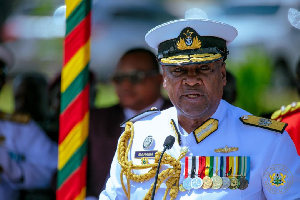 President John Dramani Mahama
President John Dramani Mahama
President John Dramani Mahama has announced that the conflict mediation process led by the Asantehene, Otumfuo Osei Tutu II would bring lasting peace to Bawku soon.
Speaking at the graduation parade of the Ghana Military Academy on Friday, April 11, 2025, the president described the situation in the area as a major security threat and stressed the need for all key stakeholders to collaborate to restore peace.
“We have triggered the Otumfuo mediation process, which saw all stakeholders participate in discussions in Kumasi on a roadmap towards peace. I’m assured by the Asantehene that the process will resume next week when he returns from his brief visit abroad.
“We need the cooperation of all to restore peace at Bawku and its environs and I entreat all sides to embrace peace as we dialogue to resolve this age-old dispute. Only two days ago, an incident in the marketplace triggered an unfortunate loss of lives and criminal vandalism of properties. I wish to emphasise that nobody gains from this situation of conflict and insecurity”, he added.
The Bawku township has faced prolonged ethnic clashes claiming hundreds of lives and posing a serious threat on regional stability and development in the Upper East Region.
JKB/AE
Ever heard of a colonial fort with a children’s dungeon and a unique shrine for the slaves? Find out the details with Etsey Atisu as he toured Fort William at Anomabo below:
![Ibrahim Iddrisu, Bawku youth president [L] with family members of the victims Ibrahim Iddrisu, Bawku youth president [L] with family members of the victims](https://cdn.ghanaweb.com/imagelib/pics/485/48594676.295.jpg) Ibrahim Iddrisu, Bawku youth president [L] with family members of the victims
Ibrahim Iddrisu, Bawku youth president [L] with family members of the victims
Victims of the recent violence between some youth groups of Bawku and the police have expressed immense appreciation to the Inspector-General of Police (IGP), Mr Christian Tetteh Yohuno for taking the pains to visit Bawku.
The victims who had sustained gunshot wounds and receiving medical attention, urged the IGP to continue in his efforts aimed at ensuring lasting peace at Bawku.
Ibrahim Iddrisu, the youth president, also expressed his appreciation to the IGP and his team and assured him of their commitment to cooperate with the Police.
“We are pleased with your coming and your words of peace and unity. We are encouraged by your hands on approach and the attempt to pull everyone together for peace,” Ibrahim Iddrisu said.
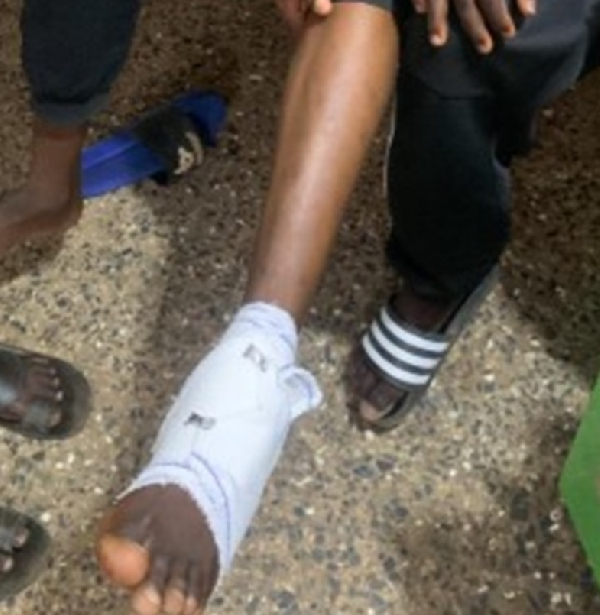
KA
The Member of Parliament (MP) for Salaga North in the Savannah Region, Alhaji Alhassan Mumuni, has reaffirmed his commitment to prioritising girls’ education in his constituency.
Describing himself as a feminist, he emphasised the need to break barriers that hinder young girls from accessing quality education.
In an interview with The Ghanaian Times yesterday, he stated that during his previous tenure as MP, he collaborated with another MP to establish the KM Model Girls’ Junior High School to promote female education.
“We started with seven girls, but today, the enrollment has grown to over 100,” he mentioned.
To support students from distant communities, he said he provided bicycles to ease their daily commute, adding that he intends to expand the school into a senior high institution.
Alhaji Mumuni, who was re-elected to Parliament after losing his seat in the 8th Parliament, emphasised that he was determined to implement key educational and infrastructural projects that were abandoned over the past four years.
He promised that every basic school in his constituency would have at least a three-unit classroom block to improve learning conditions.
“I will establish an educational endowment fund to support needy but brilliant students, and mobilise resources to ensure its success,” he assured.
He lamented the lack of a senior high school in the constituency and pledged to revive an abandoned E-Block project that began in 2016 but was left incomplete under the previous administration.
The MP also stated that the contractor had vacated the site, leaving the community without access to secondary education.
Beyond education, Alhaji Mumuni stressed the need for improved road infrastructure in his constituency.
He acknowledged the difficulties residents faced due to poor roads and assured them of his commitment to lobbying for significant developments in that sector.
On health, he vowed to complete stalled projects and improve healthcare delivery.
He expressed confidence in President John Dramani Mahama’s leadership, citing his ability to take decisive actions that will benefit the people.
Alhaji Mumuni, a grassroots politician, revealed that he first entered Parliament in the Sixth Parliament and was the maiden MP for the Salaga North Constituency.
He noted that he previously served as a District Chief Executive (DCE), a period during which he spearheaded several developmental projects.
According to him, his defeat in the previous parliamentary elections gave him time to reflect and strategise on how best to serve his people.
“The people of Salaga North see me as someone who has liberated them. My tenure as DCE and MP brought significant development, and after four years under my successor, they have given me another opportunity to continue what I started,” he indicated.
With renewed motivation, he pledged to work tirelessly to uplift his constituency and contribute to the success of the Mahama-led government.
BY RAISSA SAMBOU
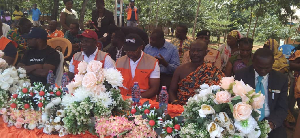 World Vision Ghana Director, Jean-Claude Mukadi (M) and the Daade Mantse of Adjiekrom
World Vision Ghana Director, Jean-Claude Mukadi (M) and the Daade Mantse of Adjiekrom
As part of efforts to promote good oral hygiene among schoolchildren in the Fanteakwa South and North Districts of the Eastern Region, World Vision Ghana, in collaboration with Unilever Ghana and the Ghana Health Service, has organised a health screening programme for hundreds of pupils in basic schools across both districts.
The children, who also received free products from Pepsodent and World Vision, were educated on oral health.
According to World Vision, this initiative is part of their educational strategy to promote dental healthcare, which will ultimately improve the living conditions of schoolchildren in rural communities.
Jean-Claude Mukadi, Interim National Director of World Vision Ghana, shared his thoughts during the screening programme at Adjiekrom. He indicated that World Vision and its partners would continue to support vulnerable communities and ensure good oral hygiene.
“So, I took some notes from all the presentations by our partners from the health and education sectors, and I want to say that it is very important for every child to have good oral health. It improves your confidence at all times and contributes to your general well-being. We at World Vision Ghana will continue to strengthen partnerships with all stakeholders to achieve good oral health.
“It is also very important to visit the dentist once a year. Parents should endeavour to take their children to the dentist annually for screening and check-ups to address minor cavities and other issues before they escalate,” he said.
The Daade Mantse of Adjiekrom expressed gratitude to World Vision Ghana for the oral health education and called on the government to help distribute free toothbrushes to schools in deprived communities.
“In the olden days, our parents used plantain sticks and ground charcoal to brush our teeth. Fortunately, technology has changed things, and now we have modern toothbrushes and brands. We are happy about everything World Vision is doing for our children—educating them, protecting them, and providing the necessary tools for their future.
“We urge the Ministry of Health and other NGOs like World Vision to support us, and we also call on the government to supply free toothbrushes to schools, just as they have promised to distribute free sanitary pads to young girls in all schools,” he said.
Rev Peter Ohene Tetteh, Chairman of the Local Council of Churches in the Fanteakwa South District, revealed that some households in the district still share a single toothbrush among children.
He urged parents to end such practices.
Victims of the recent clashes between youth groups and police in Bawku have expressed heartfelt gratitude to the Inspector-General of Police (IGP), Mr. Christian Tetteh Yohuno, for personally visiting the area and showing concern for those affected.
Many of the victims, currently receiving treatment for gunshot wounds, described the IGP’s visit as a gesture of compassion and leadership in a time of crisis. They urged him to sustain efforts aimed at restoring lasting peace in the troubled area.


“We are deeply touched by the IGP’s presence and concern. It gives us hope that peace is possible,” said a victim undergoing treatment at a local facility.
Mr. Ibrahim Iddrisu, Youth President of the area, also commended the IGP and his delegation for engaging directly with residents.


“We are grateful to the IGP and his team. His visit shows we are not forgotten. We pledge to cooperate fully with the Police to help bring peace back to Bawku,” he said.
The IGP’s visit follows a series of violent confrontations in the area, sparking calls for urgent and lasting interventions to end the conflict.
The Public Utilities Regulatory Commission (PURC) has announced an upward adjustment in the average end-user tariff for electricity by 14.75%, and a 4.02% increase in water tariffs across the board for all categories of consumers.
In a statement, the Commission justified the decision, stating that the adjustment is in line with its quarterly tariff review mechanism, as outlined in its rate-setting guidelines for the periodic adjustment of natural gas, electricity, and water tariffs.
According to the Commission, the adjustments are driven by four key variables: the Cedi/US dollar exchange rate, inflation, electricity generation mix, and the cost of fuel (mainly natural gas) in electricity production.
The move, the Commission explained, is intended to avoid both over-recovery and under-recovery of revenues.
In July last year, the Commission increased utility tariffs, raising electricity by 4.22% and water by 1.18%.
Today’s announcement of another upward adjustment means that, in less than one year, the average Ghanaian consumer has cumulatively borne an 18.97% increase in electricity tariffs and a 5.20% increase in water tariffs — a situation that adds further strain to already fragile economic conditions.
The Commission further justified the increment by pointing to the under-recovery of revenue by utility companies, a situation it described as causing serious “bleeding” in those entities. It warned that failure to increase tariffs could potentially push the utility companies out of business.
The statement also highlighted the Commission’s restraint in the adjustments, arguing that the increments could have been more severe had it opted to recoup 100% of the outstanding debts from previous quarters.
DISCLAIMER: The Views, Comments, Opinions, Contributions and Statements made by Readers and Contributors on this platform do not necessarily represent the views or policy of Multimedia Group Limited.
The Teacher Trainees’ Association of Ghana (TTAG) has expressed its appreciation to the Government of Ghana for the payment of three months’ allowance arrears owed to teacher trainees for the 2023/2024 academic year.
The payment, which was disbursed on Tuesday, April 8, 2025, is seen by TTAG as a significant gesture of the government’s continued support for education and the professional training of teachers.
In a statement issued on Friday, April 11, 2025, and co-signed by President Soale Razak and General Secretary Lala Victor, the association urged the relevant institutions to ensure that the allowances for the first semester of the 2024/2025 academic year are released without further delay.
“Timely and consistent payment of allowances is essential for the academic and professional well-being of teacher trainees,” the statement noted.
TTAG commended the government for the payment of the arrears: “We commend the Government, the Ministry of Education, and the Student Loan Trust Fund (SLTF) for this timely intervention.” It continued, “This payment is a great relief to our members who have endured financial hardships for several months.”
TTAG concluded its statement with optimism, calling for sustained collaboration between the government and stakeholders in the education sector to secure a stronger future for Ghana’s teachers.
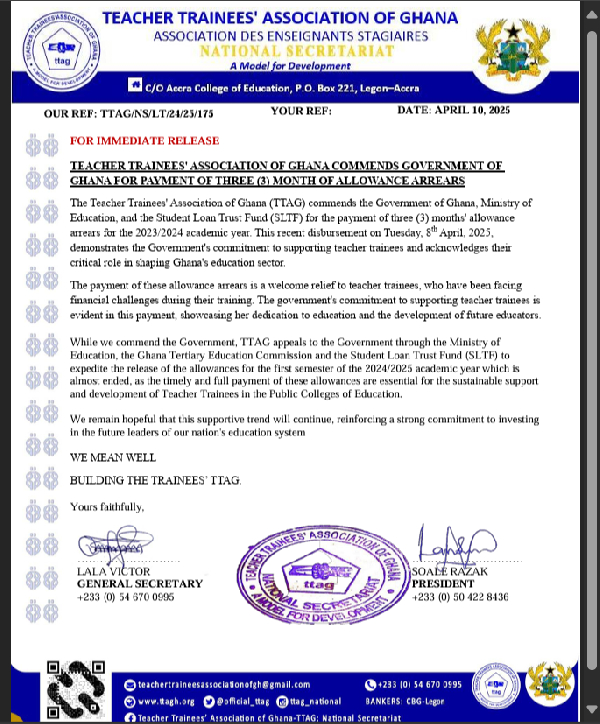
AM/KA
Meanwhile, watch GhanaWeb’s tour of Fort Victoria and the Cape Coast Lighthouse below:
<!– –>
<!–
(function(w, d) {
var s = d.createElement(‘script’);
s.src=”//cdn.adpushup.com/45999/adpushup.js”;
s.crossOrigin=’anonymous’;
s.type=”text/javascript”; s.async = true;
(d.getElementsByTagName(‘head’)[0] || d.getElementsByTagName(‘body’)[0]).appendChild(s);
w.adpushup = w.adpushup || {que:[]};
})(window, document);
–>


Margins ID Group emerged as the top honouree at the Entrepreneurs Foundation of Ghana’s (EFG) Corporate Finance Award Dinner Gala 2025, receiving two of the evening’s most coveted accolades in recognition of its excellence in digital innovation and identity technology.
The company was named Financial Innovation Brand of the Year, while its founder and CEO, Moses Kwesi Baiden Jr., received the title of Ghana’s Greatest Digital ID Technology Executive of All Time – recognitions that highlight the transformative impact the Group continues to have on Ghana’s digital identity landscape.
The awards highlight Margins ID Group’s transformative role in integrating secure digital identity solutions into Ghana’s financial services ecosystem. Its cutting-edge technologies have significantly improved identity verification, streamlined digital transactions, and reduced fraud for financial institutions across the country.
In a keynote address, Capt. Prince Kofi Amoabeng (ret.), founder of the P.K. Amoabeng Foundation, emphasized the importance of grooming the next generation of leaders.
His words resonate deeply with Margins ID Group’s goal to empower young minds through technology and innovation, ensuring that the next generation has the tools to lead in an increasingly digital world.
Founded by Moses Baiden, Margins ID Group has established itself as Ghana’s leading technology company. The company specializes in biometric technologies, access control systems, CCTV and digital identity infrastructure that enables governments and businesses to verify identities with confidence.
Its card production factory is the largest in Sub-Saharan Africa and can produce over 200 million cards each year.
Through continuous innovation and strategic partnerships, Margins ID Group and its subsidiaries have positioned Ghana as pioneers in digital identity implementation across Africa and beyond.
Starting Monday, May 5, 2025, owners of certain older Android and iPhone models will no longer be able to use WhatsApp, as Meta implements changes to the app’s operating system compatibility requirements.

The messaging platform, which is owned by Meta, has announced that devices unable to meet the new minimum operating system requirements will lose support, rendering the app unusable on these older smartphones.
The announcement, as reported by Metro UK, read:
“Currently, we provide support for and recommend using devices that run Android OS 5.0 or newer, as well as iPhones running iOS 12 or newer. However, starting May 5, 2025, only iOS versions 15.1 and newer will be supported.”

Read also
Discover what’s new on Hulu in April 2025 -The Handmaid’s Tale finale and more
It added that affected users will receive several notifications to upgrade before the due date.
“Before we stop supporting your operating system, you’ll receive notifications in WhatsApp and be reminded several times to upgrade. We’ll continue to update this page regularly to ensure that the latest supported operating systems are listed.”
The Meta-owned company explained that the changes were part of regular updates designed to maintain the app’s security and functionality while optimizing performance for newer devices.
Among the affected models are iPhones released in 2013 and 2014, Android phones that cannot update to Android 5.0 (Lollipop) – This includes Samsung, LG, HTC, and Sony phones, and KaiOs feature phones.
See the full list of affected phones below:
| iPHONE | SAMSUNG | LG | SONY | MOTOROLA | HTC | KAiOS | NOKIA |
| iPhone 5s | Galaxy S3 | OptimusG | Xperia Z | Moto G (1st Gen) | One X | JioPhone | 800 Tough |
| iPhone 6 | Galaxy Note 2 | Nexus 4 | Xperia SP | Razr HD | One X+ | JioPhone2 | 2720 Flip |
| iPhone 6 Plus | Galaxy Ace 3 | G2 Mini | Xperia T | Moto E 2014 | Desire 500 | 2760 Flip | |
| Galaxy S4 Mini | L90 | Xperia V | Desire 601 | 2780 Flip | |||
| 6300 4G | |||||||
| 8000 4G | |||||||
| 8110 4G |

Read also
Discover what’s new on Amazon Prime in April 2025 – Thrilling premieres you can’t miss
Many of the above-listed Android phones are KitKat (Android 4.4) versions, which became outdated for WhatsApp in an earlier update on January 1, 2025.
However, some of them models can be updated to Lollilop (Android 5.0) or a newer operating system.
Users with affected phones who wish to upgrade may have to check their operating systems.

Meanwhile, an iPhone repair specialist who recently went viral has met Sam Nartey George, Ghana’s Minister for Communication, Digital Technology & Innovation.
As previously reported by YEN.com.gh, the Kumasi-based technician was privileged as the NDC politician hailed and introduced him to his powerful colleagues.

Read also
The most expensive phone in the world: The top 15 expensive phone models ranked
A video of the interaction between the iPhone specialist and Sam George has stoked a frenzy on social media.
The minister later announced a collaboration between the government and Lighter to train other youths in the field.
Source: YEN.com.gh
A subsidiary of FirstRand Ltd., South Africa’s largest bank by market capitalization, is setting its sights on Ghana as part of a broader strategy to tap into Africa’s growing affluent population.
First National Bank plans to roll out private banking services tailored to Ghana’s high-earning salaried professionals and self-employed individuals.
Alongside this, the bank is also expanding its private banking footprint in Botswana, Namibia, Eswatini, and Zambia, to meet the evolving needs of its wealthy clientele.
Africa’s rising economic momentum and increasing industrialization have created fertile ground for wealth generation. As a result, global luxury brands and hospitality giants, from LVMH’s Louis Vuitton to Marriott International, are investing in the region, banking on the continent’s expanding middle class and growing number of millionaires.
According to Eric Enslin, the chief executive of FNB’s private banking and advisory unit, there is an untapped opportunity to target high-net-worth individuals.
Citing a report by Henley & Partners, Enslin noted that, excluding South Africa, the continent’s most developed economy, First National Bank already operates in five of Africa’s top 20 wealth markets, positioning it well to capture a larger share of the region’s growing affluence.
The Johannesburg-based lender’s renewed focus on Africa’s wealthy follows a strategic overhaul of its private banking operations in South Africa about four years ago.
That revamp expanded its offerings to include comprehensive advisory services and tailored solutions for high-net-worth families.
As part of the shift, the bank upskilled and re-certified several of its private bankers as financial planners, enhancing its ability to serve approximately 1.63 million South African clients earning over 750,000 rand ($38,626) annually.
While Ghana is next in line for expansion, he noted that timelines for the rollout have not yet been fully defined. The move into private banking in Ghana will build on First National Bank’s existing retail banking operations in the country.
African fashion represents the continent’s rich heritage and vibrant diversity, with each region offering its own unique blend of traditional clothing and modern style. From brightly colored fabrics to intricate embroidery, African wear has become a symbol of both culture and contemporary fashion. Whether you’re attending a wedding, celebrating a holiday, or dressing casually, African designs for men offer versatile and stylish options.
African fashion is a fusion of traditional fabrics and modern cuts.
Popular fabrics include Ankara, Kente, and Dashiki.
Latest trends showcase vibrant prints, bold patterns, and creative color combinations.
In recent years, African fashion for men has evolved to blend cultural heritage with contemporary tailoring. The latest trends feature a mix of traditional African fabrics like Ankara and Kente with modern cuts and designs, offering a range of outfits for both formal and casual occasions.
Agbada is a traditional flowing robe with wide sleeves, popular among the Yoruba people of Nigeria. This outfit has been modernized with unique cuts and embroidery, Agbada is often paired with matching trousers and a cap for a complete look.
Senator wear is characterized by fitted tops that extend to mid-thigh or beyond, paired with straight-fitted trousers. This style is widely popular in Ghana and other West African countries.
African shirts and t-shirts come in various designs and colors. One of the most iconic styles is the Dashiki, Dashikis shirts are available in both bold and muted colors, making them suitable for casual and formal occasions.
African coats, blazers, and jackets are available in various styles, with dashiki and kente blazers being particularly popular. These are often paired with shirts or trousers and come in a variety of materials and colors.
Ankara, a colorful and versatile fabric, has become a mainstay in African fashion. Men wear it in the form of shirts, trousers, suits, and accessories. The fabric’s vibrant patterns represent African culture and identity, and it can be paired with other materials like denim or leather for a unique style.
The Dashiki is one of the most iconic African garments for men. Known for its bold and colorful prints, the Dashiki can be worn as a standalone shirt, layered over a t-shirt, or paired with chinos for a more formal look. It’s a versatile piece that works for both casual and semi-formal occasions.
The senator outfit is particularly popular in West Africa, especially in Ghana. Its versatile design allows it to be tailored to suit any body type.
African men wear a range of traditional outfits depending on their region. Common designs include Dashiki, Agbada, Kanzu, and Ankara. These garments often blend traditional craftsmanship with modern styles, reflecting the diverse cultures of the continent.
In Nigeria, the Agbada remains one of the most iconic outfits for men, especially for special occasions. The flowing robe is often made from silk or cotton, with intricate embroidery.
The latest African wear for men combines rich cultural fabrics with contemporary fashion trends. Whether you’re wearing an Agbada for a formal occasion, a Senator outfit for a modern twist, or a Dashiki for a casual day out, these designs reflect the bold and diverse nature of African fashion.
The Greater Accra Regional Police Command has arrested a 37-year-old man identified as Nana Anderson, also known by multiple aliases, including Anderson Nana Abeka, Essel Kofi Elvis, and Willson Kojo Bismark in connection with a nationwide car theft and rental fraud syndicate.
In a statement issued on Friday, April 11, the police confirmed that the suspect was apprehended on April 5, 2025, at a hideout in Atasemanso, a suburb of Kumasi in the Ashanti Region.
His arrest followed ongoing investigations into a string of vehicle theft cases that spanned several parts of the country.
According to the police, the investigation revealed that on March 25, 2025, the suspect contacted a car rental partner of a complainant and fraudulently rented a Hyundai Elantra with registration number GT 114-25.
He allegedly used forged ECOWAS identity and driver’s license cards bearing different names but featuring his photograph to deceive the rental partner into releasing the vehicle at Community 25 in Accra.
After acquiring the vehicle, Anderson reportedly failed to return it and proceeded to disable its tracking system, raising alarms and prompting an investigation.
Further inquiries uncovered that Anderson is part of a wider syndicate that, between January and March 2025, used similar fraudulent means to steal several other vehicles.
These included a Kia Forte from Haatso, a Honda Civic from Amasaman, and a Kia from Spintex, all within the Greater Accra Region. The suspect is believed to have received GH₵4,000 for each stolen vehicle.
During interrogation, Anderson admitted to the offences and subsequently led police to a location in Millennium City, where his alleged accomplice, Gideon Baah, also known as Nan, is believed to reside. However, Baah was not found on the premises and remains at large.
The police have since arraigned Nana Anderson before the court as investigations continue. Meanwhile, efforts are actively underway to track and arrest Gideon Baah.
The Command also urged the public, particularly those in the car rental business, to be vigilant and report any suspicious individuals or transactions to the nearest police station.

Some concerned residents of the Nsawam-Adoagyiri constituency have come across a large stash of stolen cables and aluminium poles belonging to the Electricity Company of Ghana (ECG).
Sadly, this stash was discovered in a bush at the outskirts of the town.
According to reports, the stash is suspected to be from some 1300 ECG containers which got missing from the Tema Port.
The Ghana National Education Campaign Coalition (GNECC) has expressed concern over what it describes as an escalating wave of indiscipline within the country’s pre-tertiary education system.
GNECC has warned that a growing trend of violence, brutality, and even murder in senior high schools threatens the core foundation of Ghana’s educational system.
In a statement on April 11, 2025, the coalition described these disturbing incidents as a reflection of systemic breakdowns within schools—spaces that are meant to nurture character, knowledge, and safety.
“Schools are increasingly becoming environments of fear and unrest,” GNECC stated.
“We must ask: What has gone wrong? Is it the erosion of values, the weakening of disciplinary structures, or the breakdown in the school-home-community relationship?”
GNECC believes the consequences of this rising indiscipline are far-reaching and require urgent, collaborative action among all stakeholders in education.
The group called on the government, parents, teachers, and religious institutions to address the crisis holistically.
To that end, GNECC has proposed a number of interventions, including:
Regular counseling services in schools to tackle emotional and psychological challenges faced by students.
Monthly counseling sessions to provide structured support systems for students.
Stronger parent-teacher partnerships to monitor and correct student behavior.
Surprise inspections and mandatory searches to deter the smuggling of prohibited items onto school premises.
Mental health awareness campaigns to support students’ psychological well-being.
The coalition also recommended the reintroduction of traditional disciplinary tools, such as Saturday inspections, which they believe were effective in maintaining order and discipline in past years.
Furthermore, GNECC urged the government to consider a collaborative management model with religious bodies that run faith-based schools.
Under this approach, the government would focus on infrastructure, salaries, and resources, while religious institutions would oversee moral instruction, discipline, and teaching standards.
“This division of labor has the potential to create a safer and more productive learning environment,” the coalition noted.
These concerns follow a tragic incident involving a student at Adventist Senior High School in Bantama, Ashanti Region—Suzie Adwoa Pinamang—who was shot in the eye by a fellow student.
AM/KA
Meanwhile, watch GhanaWeb’s tour of Fort Victoria and the Cape Coast Lighthouse below:
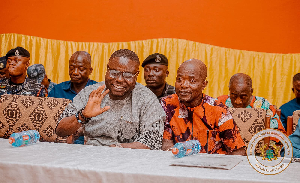 Gabriel Tanko Kwamigah-Atokple at the event in the Volta Region
Gabriel Tanko Kwamigah-Atokple at the event in the Volta Region
The Volta Region Member on the Council of State, Gabriel Tanko Kwamigah-Atokple, has extended his gratitude to all the assembly members in the region who have rallied behind President John Dramani Mahama by unanimously approving his nominees for MMDCE slots.
He explained that the confidence shown by the assembly members is an indication of their belief in the wisdom of the president, particularly with regards his selection of representatives at the various district levels of the country.
Gabriel Kwamigah-Atokple made these comments on Friday, April 11, 2025, after he participated in the ceremony at which nominees for the Metropolitan, Municipal, and District Chief Executives (MMDCEs) in the region were unanimously acclaimed.
Sharing his observations from the day in a post on Facebook, the Council of State Member described the activities as a forward-thinking approach for the region.
“I wish to personally thank all Honourable Assembly Members in the Volta Region for rallying behind the President’s nominees for Metropolitan, Municipal, and District Chief Executives (MMDCEs) and confirmed them unanimously.
“Over the past weeks, our tireless Regional Minister and Regional Executives of the Great National Democratic Congress (NDC) witnessed the confirmation processes in various districts and municipalities. I must commend the unity, and forward-thinking approach that our Assembly Members have displayed so far. Their commitment is a clear indication that our Municipal/District Assemblies are ready to align with the President’s RESET agenda,” he wrote.
Gabriel Tanko Kwamigah-Atokple also indicated that the success achieved in the region is testament of the fact that they are on the road to seeing the realisation of all the developmental hopes of their people.
He also expressed confidence in the competences of the newly-confirmed MMDCEs to deliver on their mandates, in line with President John Mahama’s vision for the country.
“Confirming the President’s nominees unanimously means we have moved from planning to action- delivering on roads, schools, health centres, sanitation, youth empowerment, and the many other initiatives our communities urgently need.
“I am confident that the MMDCEs will rise to the occasion and give their all to the development of various municipalities and districts across the Volta Region. Together, we can make Volta a model of unity-driven development,” he added.
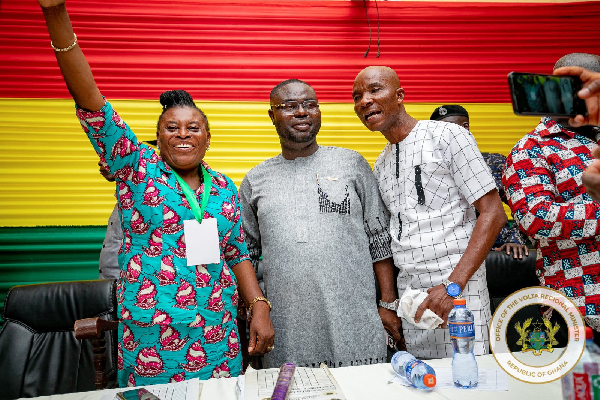
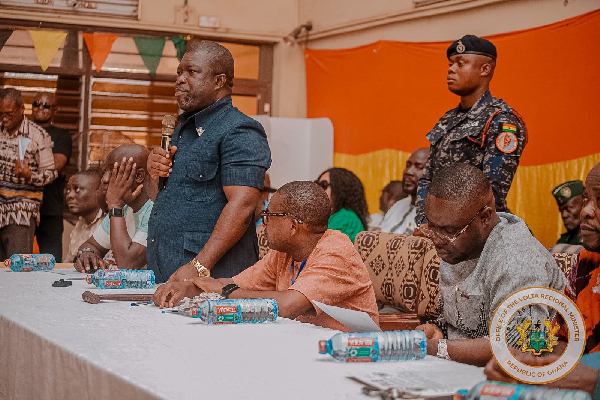
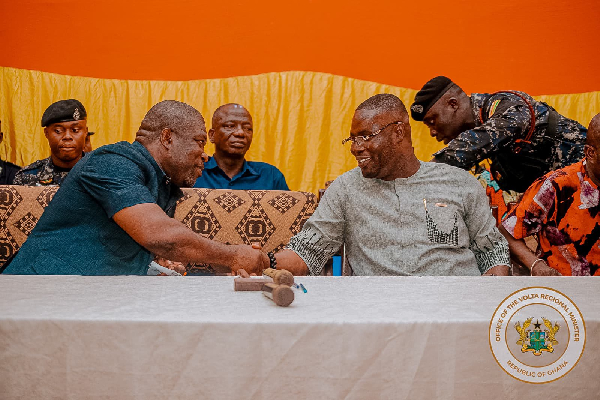
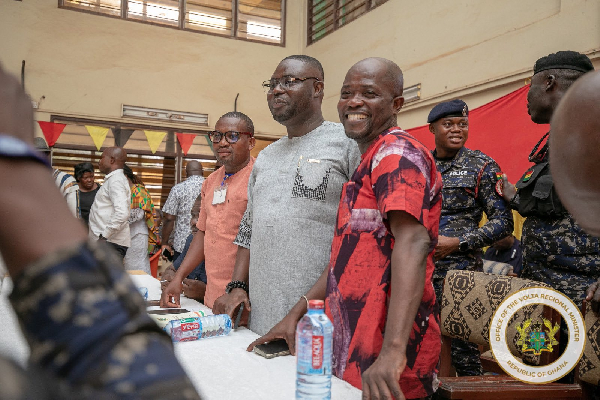
Read his full post below:
Today, I joined our hard-working Regional Minister, Hon. James Gunu and the Regional Executives led by the venerable Chairman, Hon. Mawutor Agbavitor to appeal to Assembly Members to officially conclude the endorsement ceremonies of our MMDCE nominees by the President of the Republic; H.E John Dramani Mahama.
I wish to personally thank all Honourable Assembly Members in the Volta Region for rallying behind the President’s nominees for Metropolitan, Municipal, and District Chief Executives (MMDCEs) and confirmed them unanimously.
Over the past weeks, our tireless Regional Minister and Regional Executives of the Great National Democratic Congress (NDC) witnessed the confirmation processes in various districts and municipalities. I must commend the unity, and forward-thinking approach that our Assembly Members have displayed so far. Their commitment is a clear indication that our Municipal/District Assemblies are ready to align with the President’s RESET agenda.
Today, we have achieved a remarkable milestone by confirming 18 out of 18 nominees. I firmly believe that with your support, our MMDCEs will deliver on the visions of the President while prioritizing the development agenda aggressively.
Confirming the President’s nominees unanimously means we have moved from planning to action- delivering on roads, schools, health centres, sanitation, youth empowerment, and the many other initiatives our communities urgently need.
I am confident that the MMDCEs will rise to the occasion and give their all to the development of various municipalities and districts across the Volta Region. Together, we can make Volta a model of unity-driven development.
AE
 Some of the group members at the press conference
Some of the group members at the press conference
A coalition of grassroots organizations within the National Democratic Congress (NDC) has heaped praise on President John Dramani Mahama for what they describe as the “brilliant appointment” of lawyer Martin Kwaku Ayisi as Chief Executive Officer of the Minerals Commission.
According to the coalition—comprising National Soldiers for John Mahama, Election Has Consequences Movement, and Ghetto for John Mahama—President Mahama’s decision to retain Ayisi in office reflects wise leadership and a commitment to rewarding competence and loyalty within the party.
Speaking at a press conference in Accra on April 11, 2025, Joshua Sika Nartey, leader of the coalition, expressed profound appreciation to President Mahama, noting that Ayisi’s performance since assuming office has been “nothing short of transformative” for both the Minerals Commission and the NDC grassroots.
“President Mahama’s appointment of Lawyer Ayisi is one of the best decisions of this administration. It reflects his values and experience, and he is clearly committed to the real reset agenda,” Nartey said.
The group outlined a number of achievements under Ayisi’s leadership, including:
The soon-to-be-completed Kumasi office of the Minerals Commission, scheduled for completion in June 2025.
State-of-the-art office complexes in Akim Oda, Bibiani, Bole, Damang, Kyebi, and Tamale.
Renovated staff residences in Bolgatanga, Tarkwa, Prestea, and Wa.
The training of 50 grassroots mine inspectors at top global institutions, such as the Colorado School of Mines and Curtin University.
They described Ayisi as a CEO who is not only results-oriented but also deeply attuned to the needs of the NDC’s grassroots members.
“He listens, he delivers, and he uplifts,” Nartey stated.
“His commitment to job creation and support for the underprivileged within the party cannot be overlooked.”
The coalition also warned against internal calls for Ayisi’s removal, calling such moves divisive and counterproductive.
“Anyone plotting against him is plotting against progress,” Nartey declared, urging the President and the Minister for Lands and Natural Resources to maintain confidence in Ayisi’s leadership.”
AM/KA
Meanwhile, watch GhanaWeb’s tour of Fort Victoria and the Cape Coast Lighthouse below:
The Students Loan Trust Fund (SLTF) has cleared outstanding teacher trainee allowances for the 2023/2024 academic year, disbursing payments to a total of 65,685 students from 46 public Colleges of Education across the country.
The arrears, which covered three months, have now been fully cleared. This move reaffirms the SLTF’s core mandate of providing financial support to students pursuing tertiary education in Ghana.
According to a statement issued on Friday, April 11, the disbursement also reflects the government’s reset agenda, which focuses on strengthening support systems in the education sector and ensuring uninterrupted academic progress for the nation’s future workforce.
“The SLTF remains steadfast in our commitment to ensuring timely, transparent, and efficient financial support services delivery for the benefit of students,” the statement said.
To avoid future delays, the Fund emphasized that robust measures are being put in place to ensure the consistency, reliability, and seamless execution of subsequent disbursements.
These efforts, the statement reads, will be aligned strictly with established policy directives to enhance the efficiency and sustainability of the allowance payment system.
The Member of Parliament for Zebilla, Ebenezer Alumire Ndebilla, has refuted claims that the Bawku conflict worsened under the administration of President John Dramani Mahama.
This follows the Minority New Patriotic Party’s assertion that the Bawku conflict had deteriorated under the current administration, with rising fatalities and widespread destruction of property.
This followed the recent violent clash between police and youth in the area, which reportedly resulted in deaths and injuries. Reports also indicate that the private residences of Bawku MP Mahama Ayariga and Pusiga MP Lardi Ayii Ayamba were set ablaze during the unrest.
But speaking on the Channel One Newsroom on Friday April 11, Ndebilla described such assertions as misleading and deceptive to the public.
He argued that the escalation of the conflict in recent years occurred under the New Patriotic Party (NPP) regime, pointing to significant developments that have intensified tensions in the area.
“In the last three to four years under the NPP regime, the issue has escalated to a very high extent, to the extent that a lot of things happened during that period which have exacerbated the issues in the catchment area,” Ndebilla stated.
The Zebilla MP emphasised that peace-building is a gradual process and cannot be expected to resolve longstanding issues within a short timeframe.
“You do not expect a problem that has existed for eight years, four years, to just be solved in three years. Peace-building is a process, and we really are hoping that we will be able to find lasting solutions to the problem,” he added.
Ndebilla reiterated the government’s commitment to supporting efforts aimed at achieving lasting peace in Bawku and called for a collective approach to address the challenges.
Read also…
Bawku: Recruits will go through standard procedure – IGP clarifies
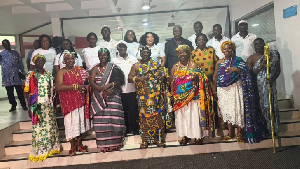 According to Nana Kwasi Osew, focusing on grassroots talent development is key
According to Nana Kwasi Osew, focusing on grassroots talent development is key
Nana Kwasi Osew, also known as Dr. George E. Gyamfi-Osew—Okuapehene Sompahene and a Chartered Marketer—has pledged his support for women’s football in Ghana as a strategic tool to empower the nation’s youth.
His support comes through the newly launched Nana Kwasi Osew Foundation, unveiled at a ceremony on April 10, 2025, in Accra.
Nana, who also serves as a Management Consultant, intends to use sports—particularly women’s football—as a platform to promote education, leadership, and personal development among young Ghanaian women.
According to Nana Kwasi Osew, focusing on grassroots talent development is key to long-term transformation.
“Everything should start from the bottom. If you look at the seed and water it properly, it will grow to become a big tree,” he said in an interview at the launch.
He explained that the Foundation will identify talented female footballers from secondary schools, support their education through scholarships, and offer structured sporting and career development opportunities.
“This is more of a calling. We all have a responsibility—some may contribute their minds, their hearts, their money—but one way or another, we are all responsible for molding our youth to be the leaders we want them to become.”
The Foundation operates under three main pillars: education, economic empowerment, and social welfare. Its decision to make women’s football a flagship focus highlights a deliberate effort to address gender gaps in sports access and opportunity.
In addition to supporting sports, Nana plans to roll out vocational and digital skills training, entrepreneurship programmes, and community development initiatives.
Still, he believes sport offers a unique avenue to build confidence, discipline, and leadership among young women.
The launch event was chaired by Osuodumgya Otutu Ababio V, Chief of Adukrom and Nifahene of Akuapem.
He commended the initiative, stating:
“This Foundation stands as a catalyst for meaningful change… Let us not only celebrate it today, but support it continually—with our time, our resources, and our voices.”
With many young Ghanaian girls showing interest in football but lacking proper support, the Foundation’s intervention has been described as timely.
By nurturing talent from the grassroots and supporting it through education and mentorship, it aims to foster both sporting excellence and social equity.
Stakeholders remain optimistic that this step could help reshape the landscape of women’s sports in Ghana while inspiring a broader youth empowerment agenda.
AM/
Meanwhile, watch GhanaWeb’s tour of Fort Victoria and the Cape Coast Lighthouse below:
The Ghana Union of Traders Association (GUTA) has announced its intention to stage a nationwide protest in solidarity with secondhand clothing dealers, amid what it describes as a deliberate campaign to dismantle the industry.
This follows a strike action declared by the Ghana Used Clothing Dealers Association on Thursday, in response to what they call sustained defamatory statements and publications by the OR Foundation—an organization known for its criticism of Ghana’s thriving secondhand clothing trade.
Speaking at a press briefing on April 10, 2025, GUTA President Dr. Joseph Obeng emphasized that the union will not stand idle while efforts are made to undermine a sector that provides employment for thousands and drives informal sector commerce.
He described the planned demonstration as a show of unity and resistance against attempts to discredit and collapse the trade.
“We are calling for accountability. We demand a forensic audit into these activities, and we call on the Attorney General’s Department and the Ministry of the Interior to act because this issue could lead to a serious security problem.
The division among traders is concerning, and if care is not taken, it could result in major conflict, which we are determined to avoid,” Dr. Obeng said.
He added that: “The government must step in as early as possible, or we will call for a nationwide demonstration. That will not benefit anyone, as it would mean all sectors of trade joining us in supporting our brothers and sisters in the secondhand clothing industry to fight against this fraudulent grouping that is sowing seeds of discontent among us”
Inspector-General of Police (IGP) Mr. Christian Tetteh Yohuno has been spotted in police protective gear as he leads a team of officers in Bawku in the Upper East Region following a violent incident in the area.
On Thursday, 10th April, he led a senior team of operations, investigations, and intelligence officers after a clash involving some youth of the town and the Police on Wednesday.
Imagine walking into a room with two light switches: one controls a single-phase system, while the other controls a two-phase system.
If the single-phase system fails, the lights go out, leaving the room in darkness. But with the two-phase system, even if one phase fails, the other keeps the lights on.
For Professor Agyeman Badu Akosa, a renowned pathologist, academic, and social commentator, this analogy perfectly captures the state of intellectual engagement in Ghana.
“Most Ghanaians are like single-phase wires,” Prof. Akosa told the audience during his address at the University of Education, Winneba (UEW) Public Lecture Series on April 11.
His words were simple but powerful: many in Ghana, he argued, are trapped in one-dimensional thinking, unable to engage with the complexities of the world around them.
In his keynote speech, Prof. Akosa emphasized that the reason for this limited thinking lies in the country’s educational approach.
He compared the narrow, linear thinking to a single-phase electrical system: once one thought process or idea fails, there’s nothing to fall back on.
He challenged the audience to think critically about the current educational structure that keeps Ghanaians intellectually constrained and unable to process the complexities of modern life.
The heart of Prof. Akosa’s message focused on reforming Ghana’s education system to nurture multidimensional thinking, beginning with early childhood education.
He firmly believes that the foundation of critical thinking and intellectual engagement must be laid early in a child’s life.
“If we want to change the way people think, we need to start by changing how we teach our children,” he said.
Prof. Akosa criticized traditional methods that promote linear learning.
“Teaching children ‘A is for Apple, B is for Ball’ might seem harmless, but it doesn’t encourage critical thinking,” he explained.
These methods, while foundational, do not provide children with the tools to analyze, critique, or question.
Instead, he called for a shift to an educational approach that encourages children to explore multiple ideas and perspectives.
For him, a key aspect of this change would involve a bilingual education system. He proposed that children be taught primarily in their mother tongue until the age of eight.
This approach, he argued, would enable children to understand the world in a language that resonates with them on a deep level.
English, as a second language, would then be introduced later at around Primary 3 when children are more capable of processing and translating concepts from their native language into English.
“If we adopt this method,” he said, “by the time these children are nine, their vocabulary and cognitive skills will amaze us.”
Prof. Akosa believes that by empowering children to think in both their native language and English, we can help them develop the intellectual flexibility needed to navigate the complexities of an interconnected world.
Beyond language, Prof. Akosa’s vision calls for a fundamental shift in the way Ghanaians view education.
He believes that every child has the potential to be a prodigy, but that potential can only be realized if the education system encourages them to think critically and engage with complex ideas from an early age.
“Our children are not empty vessels to be filled with knowledge; they are thinkers, but they need the right system to unlock their full potential,” he stressed.
This, according to Prof. Akosa, is the key to moving Ghana from a “single-phase” mentality to a more dynamic, complex way of thinking.
He called on institutions like the University of Education, Winneba, to lead the charge in this educational revolution.
“UEW has the power to become the birthplace of this change,” he said, urging the university community to take the initiative in rethinking how education is delivered across the country.
Prof. Akosa’s plea for change was clear: Ghana cannot continue with an educational system that limits its children’s intellectual growth.
The current system, he argued, does not prepare children for the future one that demands critical thinkers capable of understanding and engaging with diverse perspectives.
Instead, Ghana needs a generation of learners who are not confined by “single-phase” thinking but are empowered to think in multiple dimensions, analyzing the world from different angles.
Prof. Akosa’s words echoed i: “The future of Ghana depends on how we educate our children today.”
His vision of a bilingual, multidimensional education system is not just about language or academic achievement it’s about giving Ghana’s future leaders the tools to think beyond the ordinary, to break free from narrow, limited perspectives, and to tackle the complex challenges of tomorrow.
The path to transforming Ghana’s education system, he argued, must start now beginning with the youngest minds.
“The change starts with us, here at UEW,” Prof. Akosa said, concluding his lecture with a call to action for educators, policymakers, and the Ghanaian public.
The intellectual future of the nation, he stressed, depends on moving beyond the limitations of single-phase thinking and embracing a more complex, multifaceted approach to education.
DISCLAIMER: The Views, Comments, Opinions, Contributions and Statements made by Readers and Contributors on this platform do not necessarily represent the views or policy of Multimedia Group Limited.
The City of Memphis, in collaboration with GUBA (Grow, Unite, Build Africa), has successfully hosted a high-level delegation from Ghana as part of the recently concluded Memphis-Ghana Trade Mission—a powerful initiative aimed at fostering collaboration, attracting investment, and strengthening cultural and tourism ties between Memphis and Ghana.
The delegation was led by Ghana’s Hon. Yussif Issaka Jajah, Deputy Minister of Tourism, Arts and Culture; Maame Efua Houadjeto, CEO of the Ghana Tourism Authority; Ben Anane Nsiah, Deputy CEO of the Ghana Tourism Authority; Paul Cudjoe, Head of Mission from Washington D.C.; Mr. George Bright; Annabelle McKenzie Director, International Affairs Secretariat GTA and Chief Moomen, Ghanaian poet and playwright, along with representatives from various Ghanaian businesses across key sectors. Over several days, the group engaged with public and private institutions, identifying opportunities to build sustainable partnerships and promote bilateral growth.
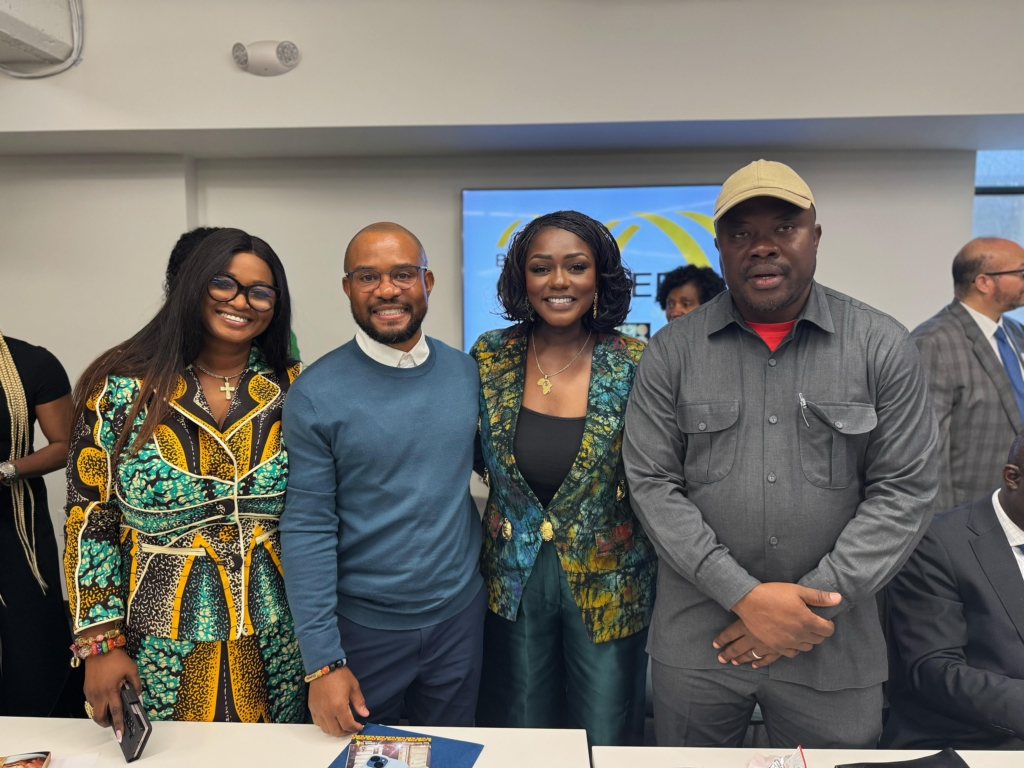
This landmark mission was coordinated by Lady Dentaa Amoateng MBE, President and CEO of GUBA Enterprise, and Augustine Boateng, Deputy Chief Information Officer at the City of Memphis, in partnership with the Mayor’s office.
The Trade Mission featured high-level engagements with:
• The Greater Memphis Chamber
• Memphis Tourism
• Memphis Black Chamber
• The Entrepreneurs Network Center
• The City of Memphis Office of Contract Compliance
• The Ghanaian Association in Memphis
• University of Memphis – Ghanaian student community
Beyond business, the delegation experienced Memphis’ cultural richness, including visits to Bass Pro Pyramid and the National Civil Rights Museum at the Lorraine Motel, underscoring the shared heritage and cultural synergies that exist between the two regions.
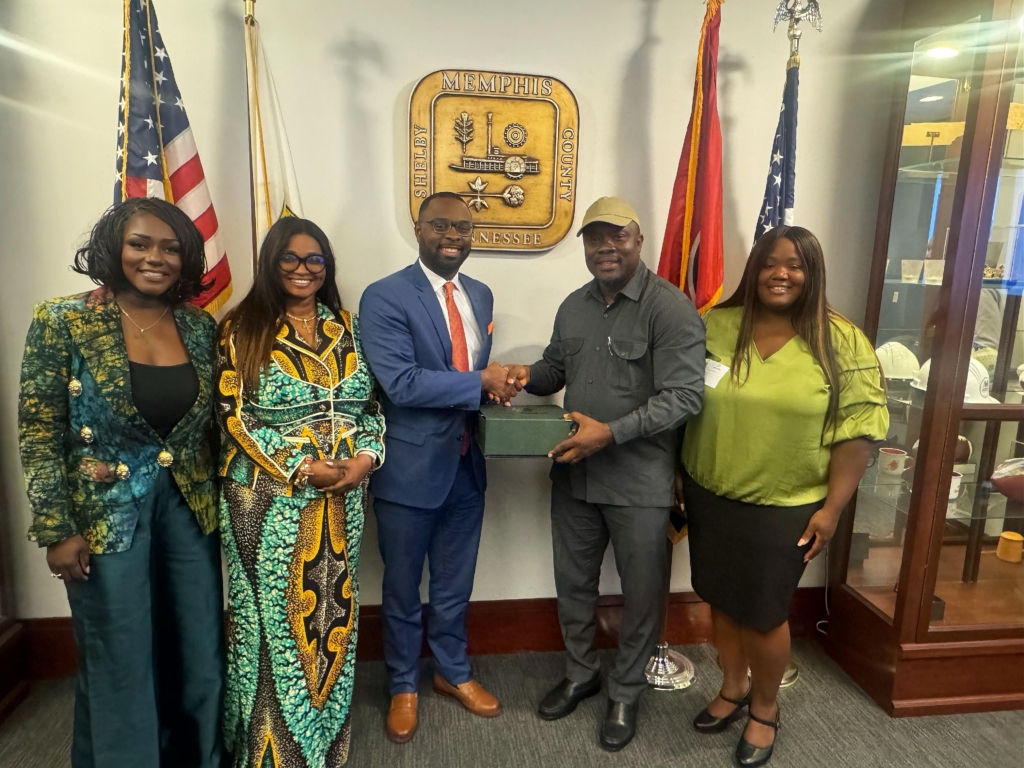
A special highlight was the delegation’s visit to the University of Memphis, where they met Ghanaian students currently studying in the city.
This session created a heartfelt connection, sparking discussions on exchange programs, scholarships, and staying connected to one’s roots—paving the way for educational bridges between Ghana and Memphis.
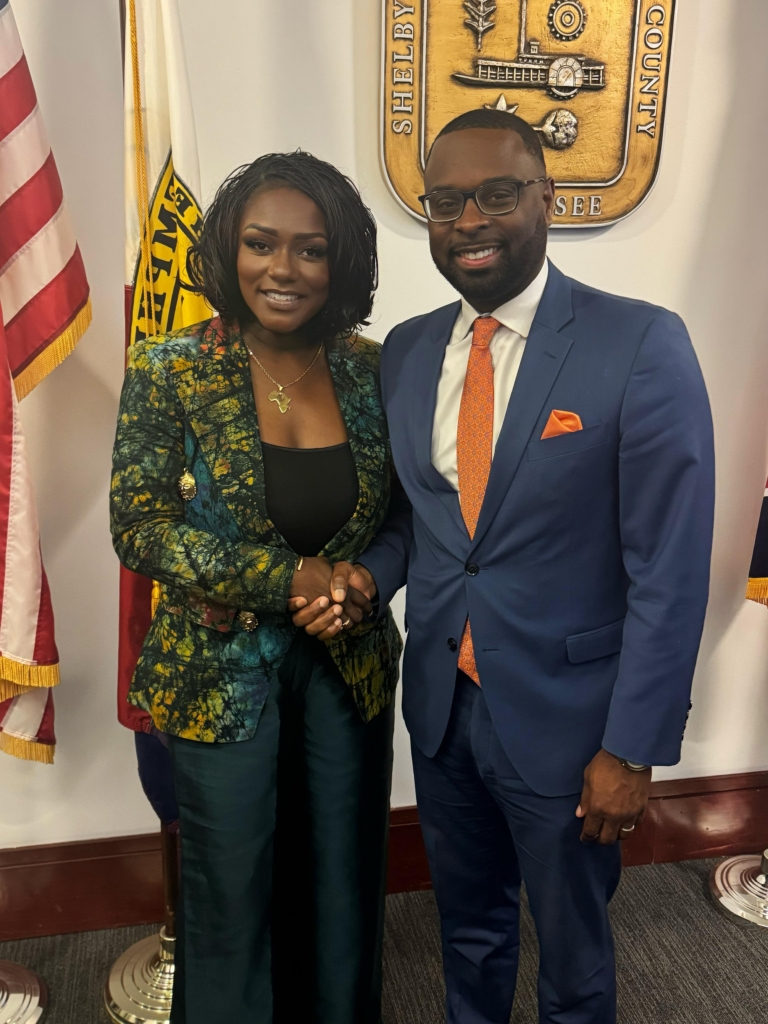
A pivotal moment of the mission was a formal meeting with the Honorable Mayor Paul Young. In a high-level dialogue with the delegation, Mayor Young reaffirmed Memphis’ commitment to building a meaningful and enduring relationship with Ghana.
“This Trade Mission lays the foundation for ongoing collaboration that can benefit our people economically, culturally, and educationally,” said Mayor Young.
Among the significant topics discussed was the potential for bilateral cooperation in public safety and emergency response.
Both parties explored plans to initiate training programs for Ghanaian police and fire service personnel in partnership with Memphis’ emergency services departments.
This initiative would enable Ghana’s public safety officials to benefit from Memphis’ expertise in community policing, fire safety, and emergency response systems, fostering knowledge exchange and strengthening institutional capacity on both sides.
The Memphis-Ghana Trade Mission marks a significant step toward building a lasting bridge between Memphis and Ghana.
From policy dialogues and business networking to cultural appreciation and educational engagement, the visit opened doors to joint projects, tourism campaigns, investment pipelines, and knowledge exchange.
Discussions also explored the potential for a Sister City relationship between Memphis and Accra, and Mayor Young was officially invited to Ghana to lead a reciprocal delegation.
As the Ghanaian delegation returns home, both sides are energized by the momentum built and are committed to nurturing the partnerships established. GUBA is proud to have collaborated with the City of Memphis to bring this historic mission to life and remains focused on strengthening bonds between Africa and the diaspora.
About GUBA
The Grow, Unite, Build Africa (GUBA) Enterprise is a social enterprise dedicated to diaspora engagement, African excellence, and global collaboration. With a strong record of building cross-continental partnerships, GUBA creates platforms that amplify African voices, empower entrepreneurs, and drive social and economic impact.
Through initiatives like the Memphis-Ghana Trade Mission, GUBA continues to serve as a powerful bridge between Africa and its global diaspora, fostering sustainable development and inspiring unity around the world.
DISCLAIMER: The Views, Comments, Opinions, Contributions and Statements made by Readers and Contributors on this platform do not necessarily represent the views or policy of Multimedia Group Limited.